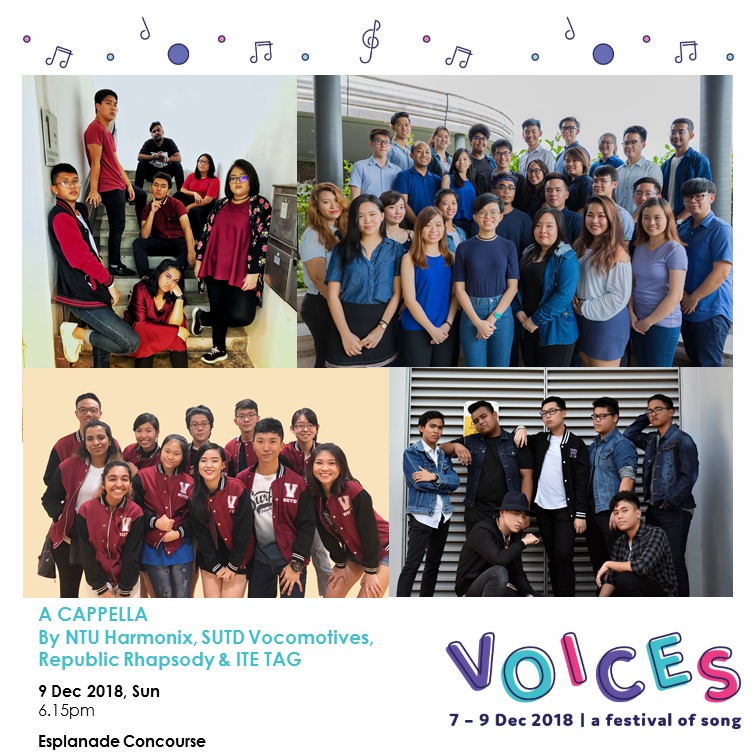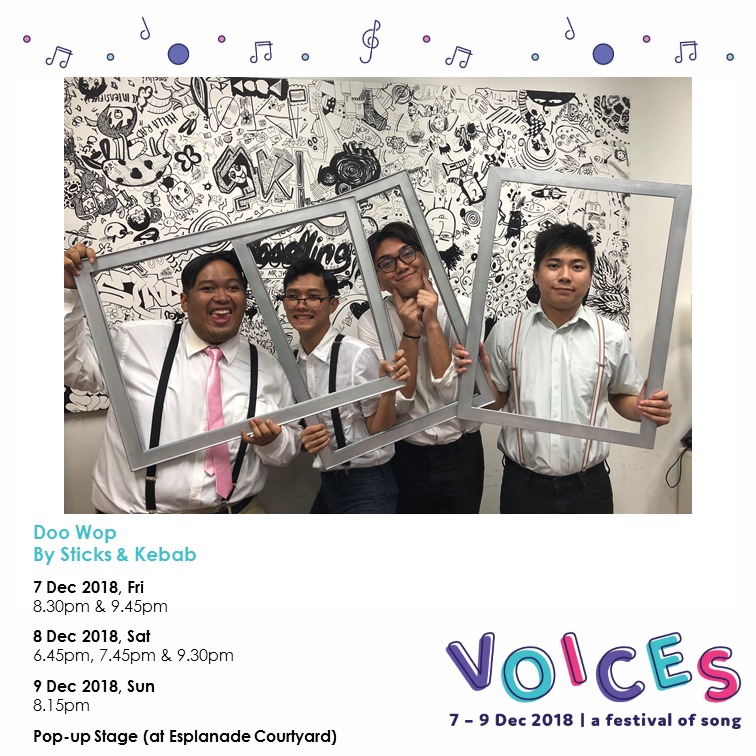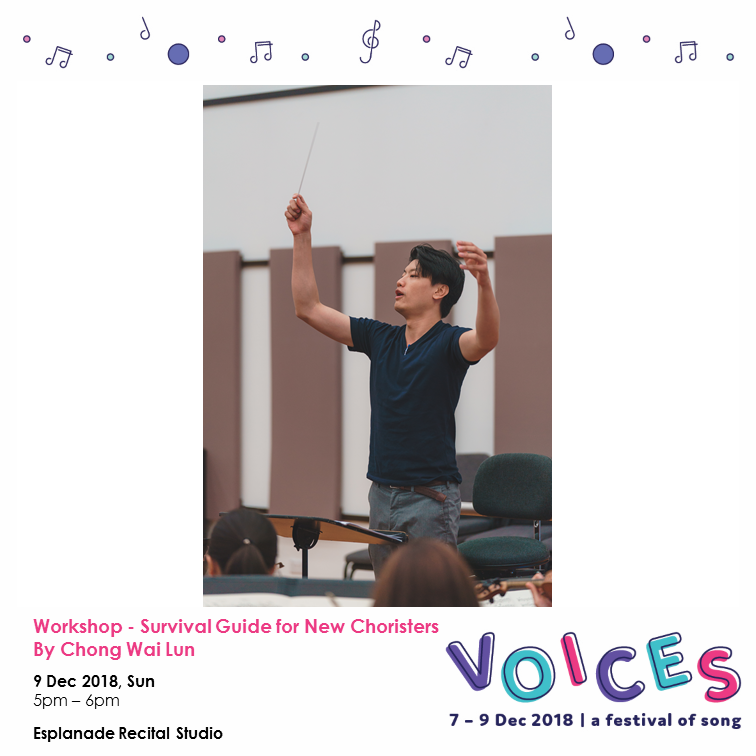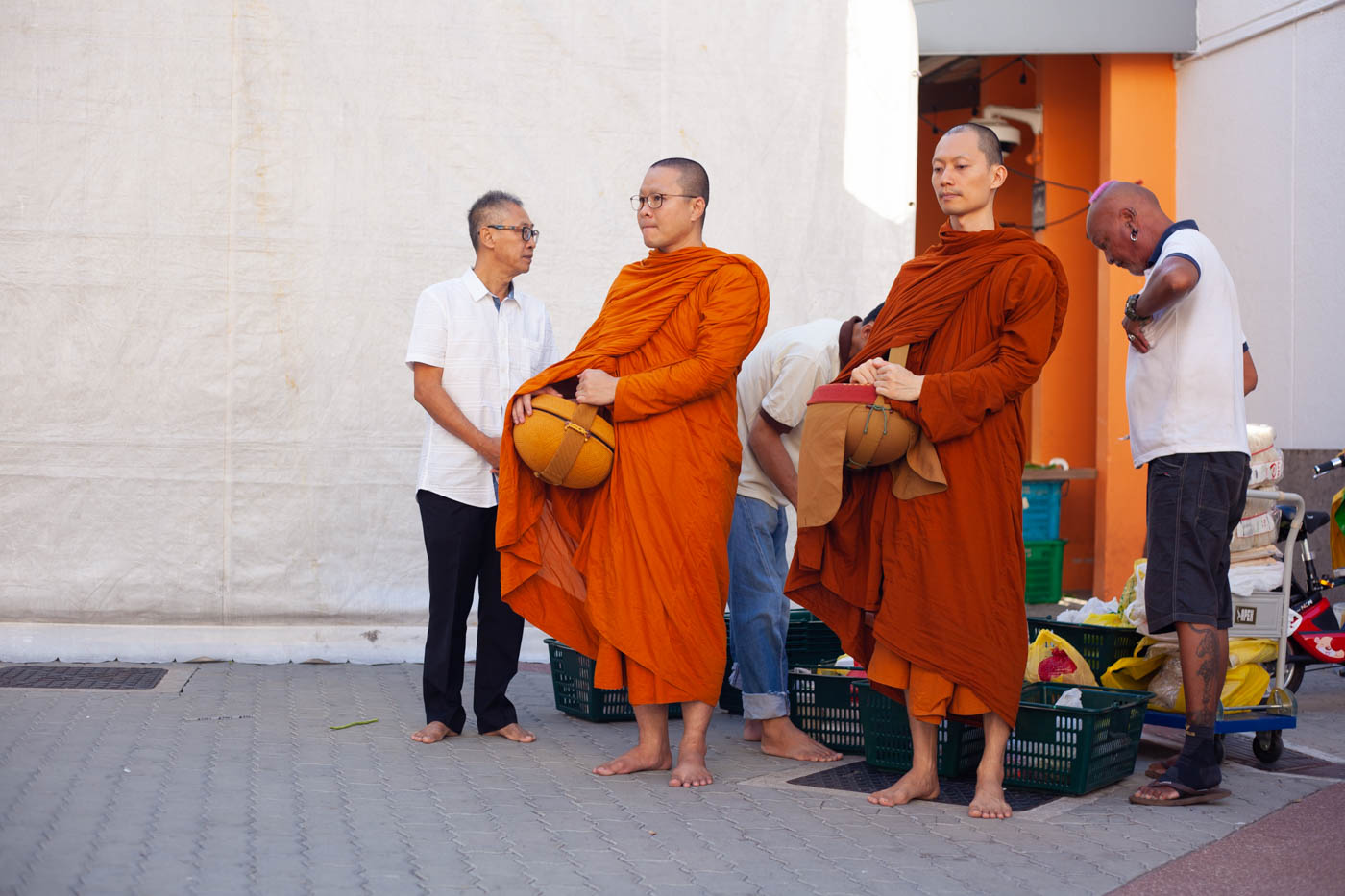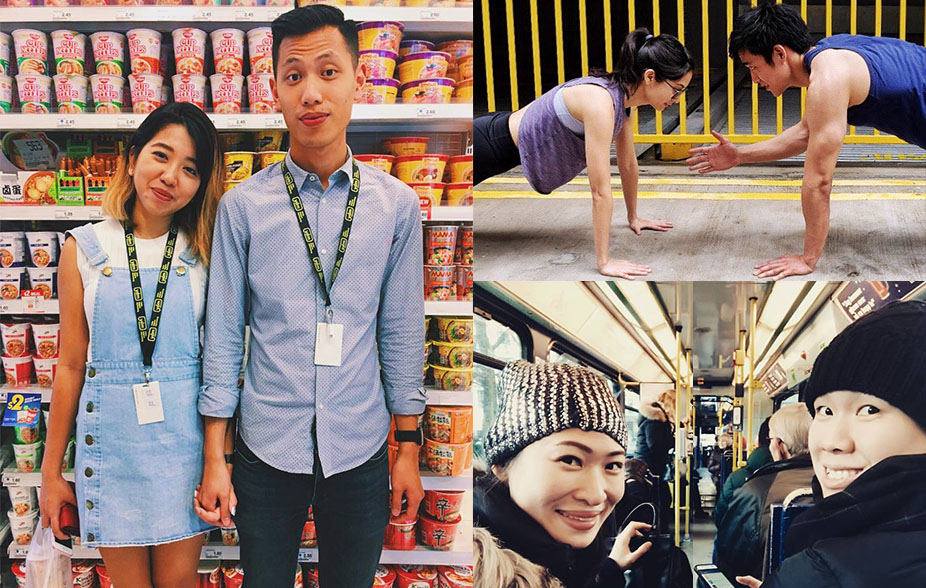At 5am where most of us would have still been deep in slumber, Phra CK gets out of bed. Like the other monks who are residing at Palelai Buddhist Temple at Bedok, waking up at the crack of dawn is nothing out of the ordinary.
It’s an impossible feat for most of us, but for Phra CK and the other monks we saw when we visited the temple two weeks ago, this is a lifestyle that they have long accustomed to.
Back when Phra CK was training in monastics in Johor, meditation sessions start as early as 4am every day. Over at Palelai Temple, the first agenda starts at 6am daily—the morning chant.
6.00AM - Chanting
So there I was, at the start of my day where I will tail Phra CK to find out what a monk’s life is like in Singapore. 34 this year, Goh Chun Kiang is a monk by choice and was one of the youngest in Singapore to be ordained at 23 years old.
In a video interview with us later on, Phra CK shared how he wanted to be a monk ever since he was a primary school kid. Seeing the conflicts between his mum and dad back then made him think about the meaning of true happiness. Then, the shows he watched and books he read further influenced his perspective of wanting to be a monk.
Now a ‘full-time monk’, he resides in Palelai Temple and lives according to the daily agenda set out by the temple.
Together with the Millennials of Singapore team, we sat in silence at the back of the main shrine as we waited for the morning chant to start. The only sounds were the occasional creaks from when the wall fans oscillated. The monks entered singly, each of them finding their own spot in front of the Luong Pho Phra Buddha Jinaraj. And as everyone waited in silence, I actually felt like I would on a very relaxing holiday—calm and with a clear mind.
The temple is open to the public and while we were there, a few people came by for a short prayer and offer incense. A handful joined the morning chant, although, Phra CK shared that the evening chants usually see more crowd.
There is a rack at the back of the hall with chanting books as well, so members of the public can refer to the book and chant along if they wish to.
Midway through the session, I took a copy to attempt to follow the monks in chanting. After flipping through the pages, I gave up, for I had no idea where they were already at. And it was in Pali language.
When I caught up with Phra CK later, I asked how he even managed to memorise approximately 30 minute worth of chants and what more, in a language that doesn’t come naturally to us.
“If you’re talking about intensive memorisation, it took me a month to remember.”
These daily chants covers several aspects of Buddhism, of repentance, of dedication of merits, and of various teachings in Buddhism among others. For Phra CK, the daily chants is also a sort of recollection of the fundamentals in Buddhism and monastics. The chants help him stay mindful.
6.30AM - Breakfast
Mindfulness is one of the key principles they practice in their life as a monk. Such that even during meal times, the monks have their food in silence even as they sat together at a round table.
The whole idea of mindfulness, Phra CK explained, is also to overcome desires.
The exception is if they have urgent matters that require them to talk over their meal. I guess that explains why their meal times are only 30 minutes.
We followed Phra CK to their meal area and watched from afar, for privacy reasons during their meal times.
One of the temple volunteers later invited us to join the other volunteers for breakfast at the kitchen, when the monks were done with their meal—the dishes that are served to the monks are collected back to the kitchen area for volunteers’ consumption after.
When I saw the dishes, I was struck by the quantity and variety of dishes there were there—more than 10 plates of food. The dishes reminded of homecooked meals at my granny’s place: stir-fried vegetables, prawn with leek, carrot cake, and bread, among others. There were also about five plates of fruits like bananas, jackfruits, lychees, and apples.
Unlike some sects of Buddhism that require one to be vegetarian, Phra CK and the other monks at Palelai Temple consider food a blessing from lay people, and they consume whatever is given to them, including meat.
7.00AM - Area Cleaning
Part of their daily morning routine includes an area cleaning right after breakfast. The scope of cleaning depends on the number of monks staying there and what there is to do on that day.
On that day, Phra CK was mopping the main shrine. On other days, he could be clearing rubbish or sweeping the floor.
8.30AM - Alms Round
At around 8.20am, we headed out to a neighbourhood market area at Tampines, together with another monk and five temple volunteers, who drove us there.
Because being a monk means renouncing material wealth, they have to depend on lay devotees for their food. This is one of the reason they go out on their alms round daily, a traditional practice where they collect food from devotees.
Before this, I had, with my very limited knowledge and my misguided impression of monks, envisaged the alms round to be where they go around coffee shops or markets asking for food.
Instead, a crowd of devotees came up the moment the two monks took their spot at a central location in the middle of two coffee shops and the side of a supermarket. If you didn’t pay attention, you would have thought that people were rushing up to get freebies. The baskets and trolley the volunteers prepared were filled up within the first five minutes, and were wheeled away to be loaded up to the car by some of them.
A short 15 minutes later, we were back on the car headed back for the temple.
I asked Phra CK if the alms round is usually this short (and easy). He explained that at the beginning, it was more challenging as people didn’t understand what they were doing. There were even times where the Police has come up to check on them.
However, as the monks at Palelai Temple have already been following the same Alms Round schedule for more than 10 years, residents and devotees around are already familiar with this. The regular devotees will also have stand-by for the alms round when the time comes.
“Volunteers recognise the devotees, so once they see that they have more of less come already, then can go already.”
Although, this isn’t something that is practiced by every practicing monk. In certain countries, alms round is highly-frowned upon as natives see it as a shameful act of begging.
“This is why during the alms round, we have to look down and stay silent. We are not supposed to solicit donations. We cannot ask for anything, because that becomes begging, and we cannot speak or give any advice in return because this exchange becomes a form of trading.”
This is one of the ways you can tell bogus monks apart from the real ones.
Upholding A Strict Code Of Conduct
For those who have ordained and devoted their life to monastics, these are also just a few of the 227 rules that they have to abide by.
Some of the rules include basic ones like not lying and not killing, and those that lay people would find hard to live with: Not being able to accept or use money, not being able to laugh loudly, and even extremely specific rules like “not to use mattresses, cushions or cloths filled with cotton or kapok.”
Screen capture taken from dhammadana.org
Even meal times are ‘regulated’, as monks are not allowed to eat after noon. Thus, their second and only other meal for the day happens after the alms round at either 9.30am or 11.30am. I cannot fathom how I were to survive with not eating after 12pm, but for Phra CK, these things aren’t a big deal. It is all a matter of conditioning.
“Before I ordained, I went to study up on the rules. When I first read all of them, it was a bit ‘wow’. Initially, it looks impossible when you just read it, but when you apply it to daily life, you just get into it.”
In the end, these drastic lifestyle changes are possible because they have been trained. Nonetheless, there were many things that he admitted having to give up.
“A lot of things. Personal favourites like gaming. I used to love gaming. Music as well. But all of that were just temporary and we are trained to overcome such desires at the conditional retreat, before getting ordained. At the beginning, there was something like Cold Turkey. But over time, I just get used to it.”
As a monk, he dedicates the rest of his day (free time) to meditations, memorising chants for different rituals, and on his own assignments. He is also currently an advisor to a Buddhist youth network, and helps with leadership training, and interfaith training.
Now that Phra CK has pledged to an ascetic lifestyle, I learn that the only thing he is able to watch (by choice) are news and documentary films.
With no worldly pleasures to look forward to unlike possibly all of us, and no material wealth to strive towards, I wondered what, then, motivates Phra CK every day. Are monks really, like those corny Journey to the West kind of movies, just in search of achieving Nirvana?
“Yes. For me it’s spiritual money. Happiness.”
The ultimate goal as a monk is to be fully dedicated to overcome desires, and attain peace and happiness. However, it is contradictory to say that that is an end goal either, as it signifies desire.
“Monkhood for me is a full-time volunteer job, or a lifetime volunteerism. It’s a very personal spiritual cultivation.”
Most of us will never fully comprehend the life of monks and nuns in our lifetime. From our perspective, it is a big sacrifice on things that make up our life today, all to pursue a life that surrounds religious teachings. Furthermore, it is a devotion of one’s life in something so intangible.
After spending half a day with this 34-year-old Singaporean millennial however, I am reminded of how life is really that simple if you mean it to be. We just live in an entirely different world, with completely different perspectives of the world and of our existence. While we are caught up with trying to live a hedonistic lifestyle, being a monk for Phra CK is being free. Free from the need to seek fame, fortune, love, or any sort of material pleasure to live happily. Because at the end of the day, a fundamental tenet of monasticism is impermanence.
Why fret over all those things when we will all go one day?
Also read: 3 Millennials Who Prove That Age Isn’t A Barrier – Keeping Singapore’s Traditional Arts Alive.
Singaporeans are always complaining about life in Singapore. Comments like “this is the gahmen we vote for,” and “not happy then migrate lor” have been commonplace on online forums and can be found on pretty much any post related to Singapore.
Even a recent post that mapped out the key financial stages for Singaporeans have managed to rouse the ire of some Redditors, who alluded their dissatisfaction of Singapore's governance through proclaiming their wish to leave for greener pastures.
Image Credit: DollarsAndSense
Migrating seems to be the ultimate solution to every bit of law or policy that Singaporeans are pissed with. And it’s human nature—the grass is greener on the other side. But is it really?
One country that comes up every time someone talks about wanting to migrate is Australia. Many of us think that life is better Down Under, and we envy those who get to enjoy the slower pace of life there. This is based upon the sheer number of times we have heard stories of people migrating, of those who want to migrate to Australia, or those who wish for an opportunity to relocate there just to have a different life experience.
So What’s Life Really Like In Australia?
Awhile back, I spoke to 33-year-old Jasmin, who shifted to Perth in 2002 to pursue her dream of becoming a vet. After spending five years there, she decided to make the switch to permanent residency.
“Life in Perth is pretty slow paced and relaxed compared to Singapore. The people here are more interested in enjoying life in the present than slogging away or planning for the future.”
Meanwhile, Singaporeans are perpetually stressed out about working hard for a better future. The need to push ourselves now while we can has been so indoctrinated in us that you'd find many Singaporeans chasing career milestones up until retirement.
Don’t get me wrong. The desire to strive for excellence is great and it is a respectable trait in Singaporeans to have such pride and ownership in our work. But our work culture has also come to a point where most people find it hard to switch off after work hours. Likewise, we find it hard to accept slow or late responses at work, especially when it comes to work that we deem "urgent".
Even if our work demands our attention at midnight or when we are on vacation, we would still do our best to squeeze out time to attend to it. I’d like to believe many of us do it out of personal accountability but any honest man will also tell you that they fear losing their jobs otherwise.
Such is the work culture difference between Singapore and a place like Australia.
Image Credit: Jasmin
For another Singaporean, Lydia*, it is this culture difference that she has come to love ever since she relocated to Sydney more than a year ago. She got jaded by the hectic lifestyle in Singapore and had decided to shift in search of personal growth opportunities.
“I managed to get a job in a fintech company and it’s so unlike what I had expected. It’s all about a life outside of work, and if someone needs to get you, they have to wait till it’s tomorrow. Nothing is that urgent and your time or life outside of work is respected.”
The change in pace and the shift to a culture that places more focus on a healthy work-life balance gave Lydia more time to her other pursuits in life, like more personal time with friends and family as well as more time for leisure—exactly what many Singaporeans wish they have.
Although, Lydia acknowledged that she was lucky, as everybody's experience will differ based on the industry practices, company culture, and the dynamics within a company. Where she is at, she also enjoys perks like flexible working hours, going on sick leave without an official MC, and free coffee at every team meeting.
These perks are only possible as employees respect the integrity based system it is run on. It only takes one bad sheep to abuse and destroy such a system, and if you think about it in Singapore’s context, this will probably not be possible here. Remember when we used to have Ofo, Obike, and Mobike?
Despite the welcome change in work-life balance and employee welfare, finding a job wasn’t that easy for Lydia initially. Her attempts to find work in her area of expertise came to nothing as her Working Holiday Visa restricted her from staying in the same company for more than 6 months. Most of the jobs she had came here in search of required someone with a longer commitment.
“Initially, part of me expected to get a job pretty easily, even if it means I had to do odd jobs here and there. I thought like Singapore, it’ll be easy for me to get a retail or F&B job for example, but it wasn’t that easy.”
To get a retail job, she had to submit a video of her speaking and presenting herself. She’d also need an RSA certification if she wanted to work in F&B.
Fortunately, settling in wasn’t an issue because her partner was already living there and had sorted out the nitty-gritty of moving, like finding accommodation, sorting out the lease, and setting up the utilities.
Nonetheless, the pressure of living independently and solely off her savings, began to build up. “The cost of living in Sydney is really high, and I saw how quickly my money was depleting about 2 months in. I started to put a lot of stress on myself to find a job and somehow no one was getting back to me.”
Lydia later chalked up even more expenses when she had to be sent to the hospital primarily due to her stress and anxiety.
“I was broke and in a country with no medical benefits or subsidies for me.”
“Being jobless and living under your parents roof was stressful but being jobless and having to worry about rent is a heart attack waiting to happen.”
She only managed to secure her current job five months after she relocated. Ultimately, she admitted that it was a job that she settled for as there were bills to pay.
Singaporean filmmaker Tim* echoed Lydia’s sentiments on the work landscape in Australia.
The 28-year-old spent 5 years in Sydney, where he pursued his interest in film in a university there. While studying, he also took up several work projects and jobs. In the media and film industry he is in, he explained that while Australia has more opportunities for him, the overall work landscape there is pretty similar to Singapore’s. It is as highly competitive there as fresh graduates and experienced locals and foreigners are always rising up and competing for the same jobs.
“I think it is important to manage [your own] expectations, know what you want to do, work hard on your craft, and to be open to change if it comes.”
Daily Life Differences
Day-to-day conveniences and living expenses are other aspects that one needs to consider before making the shift.
If there’s one thing all of us are right about, it’s the short operational hours of shops there. Most of the shops there shut by 6pm and some buses end service at early evenings.
Born and bred in Singapore where we gripe about shops closing at 9.30pm, I wondered how these Singaporeans aren’t bored there. How do you ‘survive’ when ‘everything’ is closed by the time you end work?
“Usually the shopping malls close early but in Sydney the clubs, karaoke joints and movie theatres still open till late,” said Tim.
As for Lydia, it took her awhile to get used to the largely outdoor lifestyle compared to what most of us are inclined to do in Singapore: “People [in Australia] tend to go to the beach, surf, drive up the coast, go on road trips, camping, hikes, and go to the markets. That’s what my partner and I do besides all the housework. New South Wales is massive and we never stop being tourists if money permits.”
Image Credit: Lydia
The early closure of shops also means that many food places shut early. But Tim assured that “there are definitely food you can get at supper hours but your selection is really limited. McDonald’s are open 24 hours and that’s about it. There is no Al-Ameen to save you from a grumbling stomach at 2am.”
Eating out in Australia is also expensive compared to Singapore. This is undoubtedly one of the best parts of living in Singapore—the abundance of food options and how you can easily get a complete meal from as cheap as $3.
What Kind Of Life Do You Want?
With all that said, we have to acknowledge that life isn’t perfect. No matter where we go, there is bound to be problems of some sort, and it is important that we consider every facet of our life and habits before we go on a great migration. There are also plenty of helpful guides online to walk us through specific areas like taxes and cost of living.
Another tip from Tim is to know what we want.
“I guess Australia is good for anyone who wants to try a different lifestyle and explore a different country. If you pick Sydney, be prepared to work hard and be ready to compete with the best.”
There’s no rights or wrongs to migrating and only you would know if life would be better for you elsewhere. It is still a big decision to make, having to leave your entire life behind to set up a new one in a foreign land. At the end of the day, it boils down to where you want to call home.
For me, as biased as it is for someone who has only ever resided in Singapore, and for all the imperfections in our policies and infrastructure, home is Singapore.
Also read: The Hopes And Fears Of 20-Somethings.
(Header Image Credit: Zoe Holling on Unsplash)
This article contains an image that some may find disturbing.
Running. This word, synonymous with everyone for a sports activity that requires a certain amount of endurance and physical capability. To me, it means so much more.
There is a love-hate relationship whenever it comes to sports in Singapore, especially running. People with busy lives would see it as an act of healthy living, and do it for the sake of keeping healthy and striking bucket lists off by completing a marathon once in their life. Those bordering on the edge of insanity do it for more than living; bragging rights, personal bests, medals, finisher tees and even podium positions.
For me? Running edges on irrationality and a particular quest. A quest to live. A quest to be better than who I am today, and what I was yesterday and many yesterdays that have passed.
My life
Growing up as a primary school student, I hated sports and any activity that required me to have a certain level of physical endurance. That resulted in my obesity and chubbiness at a young age.
When we're at that age, we are ignorant of things that happen beyond our scope of understanding. Things like cancer, life and death, and also sometimes, our future.
As I entered my teenage years, I started to become more self-conscious. I started to realise every change on my body, and was always wishing I looked a little bit more handsome than that guy who has all the girls at school swooning over.
Then, there was one particular change that made a huge impact on my life, even until now. ‘Cold sores’ and ‘white patches’ started appearing on my body, especially on my thighs, hips and back.
I initially thought these 'odd patches' were nothing more than puberty taking charge of my body, but I was so wrong.
Living in a body that wasn't living up to me
Those sores started to graduate into fungus-like plagues and scars on the majority of my thighs and hips. My skin started to flake and became overly sensitive and extremely dry—like the Sahara Desert. The white patches on my body multiplied faster than you can say cell division.

Following the advice of my aunt, I went to the doctors to find out what I really had.
After a few weeks of going back and forth with several consultations, blood tests and biopsies, I finally had a semblance of what I was suffering from.
I guessed my aunt thought I was too young to understand and kept it from me, passing it off as a severe form of psoriasis or ezcema and only wanted the best for me. I went through several sessions of phototherapy—a therapy that involves being in a chamber where UV lights penetrate your skin.
My skin seemed to get better with each session, but the side effects were obvious. I hated going to each and every session because it was troublesome to travel to after school. I was missing classes and couldn’t do the things I wanted to do like playing games and hanging out with my friends. I suffered from fatigue, migraines, and my skin started becoming extremely sensitive.
All of that happened while I was still just a teenage boy, and I thought nothing of it. I decided not to go ahead with the sessions as that took the life out of me. I brushed my condition off as something that would get better and disappear with age.
I continued to do what I love; I played hockey for the school and national teams, and did well enough in my O-levels to get into the polytechnic and course that I wanted, and life picked up for awhile.
I felt that life was only just beginning.
Exempted from NS—Am I a 'lower-class citizen'?
Polytechnic was a blast. I made friends who even till today, are the bestest ones I can ever ask for. I went through experiences that I will go through again in an instant if I can rewind time.
After graduation from polytechnic, I was preparing for my next stage of life—National Service. I had high hopes and expectations for myself; to serve the country I was born in and that has given me so many opportunities, and to also give back to my father who has sacrificed much for my well being.
The first hiccup occurred during the compulsory medical check up at CMPB (Central Manpower Base). The medical officer wanted to give me a PES D and go for further check-ups at a doctor to make sure that I can serve, but I refused and begged for him to give me a better PES status. Maybe it was my ego, or maybe pride, but I didn’t care about my skin condition. I just didn’t want to be judged as a person attempting to escape military service.
All was well, until the month before my enlistment date.
My mother being the worrywart she was, came to me in tears telling me to go back to the doctors as she didn’t want to see me suffer. Upon her request, I went through the same troublesome processes again—consultation, biopsies, blood tests, and finally, I got my diagnosis.
It was from this diagnosis that finally revealed that my condition has advanced to a stage where it was cancerous. Even so, I wasn’t bothered by what I heard, and I just wanted to continue with my life.
Everything happened in an instant and things started moving very quickly. On the same day of the diagnosis, I received a doctor’s letter stating that I was unfit for military service due to a life-threatening condition.
Majority of guys at that age would be joyous to be exempted from NS. They'd feel happy for not having to ‘waste two years of their lives’ doing something they never wanted, but I was devastated. My future plans got derailed, and I didn’t know what I wanted to do with my life.
I felt like a totally different person as compared to others, and I felt like a lower-class citizen. What kind of stories would I have to share with friends and family in the future?
For a while, I felt really lost. I was dejected and I wished I knew people who was in the same boat as me, feeling what I felt.
I was physically fit, but medically unfit—a term that a majority of people in Singapore fail to understand.
I get questions like "you run so much, why cannot serve?!", and "you run so many marathons, chao keng ah?!".
What can I say?
It was so hard to have to explain the situation to others when I was already finding it hard to accept it myself.
After a long and hard struggle with myself, and with constant support from my closest friends and family, I came to terms that I will never be ‘normal’. I realised I was born this way, and everything happens for a reason, and that we just have to understand and respect that particular reason, no matter what it may be.
Everything happens for a reason
I took a gap year from the everyday stresses of life to find out what I really wanted to do. I worked part-time, travelled, relaxed, played games, but most importantly, I continued with my passion—running.
Things started to fall into place. I got accepted into university and was the very first batch of full-time students in SUSS. I completed more marathons, races, and became faster and better. I found a part-time job which paid well and made friends with some amazing colleagues and bosses that I will never forget.
People who don’t know me judge me for being exempted from NS, for being a ‘chao keng’, but that’s okay.
People avoid me once they see the scars and plagues on my thigh thinking that they are contagious, but that’s okay too.
People chide me for making unconventional decisions, thinking that my dreams are impossible, but that’s fine as well.
At times, my thoughts stray because I get the feeling like I am a huge burden to everybody because of my condition, as I am unable to do the everyday things that normal people do.
But do I just want to be normal?— I'd give anything to be.
And that is why I run.
15 marathons and a few ultramarathons later, I found out that the people who mind, don’t matter and the people who matter, don’t mind. I am really thankful for having awesome friends and family providing all kinds of support in the crazy pursuit of my dreams.
Who, or what do I run for and why?
Running is a release. Running is an outlet. Running is therapy.
Running doesn’t need reason, we just go.
We are but creatures of passion, driven to achieve beyond the norms.
The quest
Right now, I am living the best life that I can ever have. I work in a full-time job that utilises the best of my abilities, and fulfills the things I have always wanted to be and do in life. I am a coach, a tour guide, and managing the operations of a small company.
Everyday, I know how fortunate I am to have people around me who accept me exactly as I am.
I have an amazing girlfriend who provides me with all kinds of support—emotionally, physically and psychologically, and that is something I am forever grateful for. And I am more than grateful for a family who lets me figure out my life and supports me through my journey.
Because of all the support that I have, I have embarked on a quest that seems achievable and easy for a majority of my running friends, but near to unattainable for me due to my skin condition. I fatigue easily, I don’t recover as fast as others, I don’t perspire (which is extremely dangerous because my body doesn’t get cooled and that results in heat injuries) but that won’t stop me from trying.
The quest to break the 3-hour marathon barrier.
I don’t have anyone to prove to but myself. Excuses are plenty, but I love to find that one reason why this matters to me.
We want to prove to ourselves that limits are meant to be broken, and that cancer is just another limit in life that is waiting to be broken through any means possible. Because to earn the best days in life, we have to fight through some bad days to know that it is going to be worth it in the end.
This article is contributed by Goh Chang Teck.
All images used in this article are provided by the contributor.
Also read: Kicking The Habit – My Struggle With Quitting Smoking.
(Header Image: adapted from an image provided by the contributor)
If you’ve ever looked down at the spare tire around your waist and felt sad for yourself for having grown so fat, then resolving to diet but never actually getting down to it, cheers.
Unless you are one of the lucky bastards blessed with high metabolism, you will know how hard it is to stay fit. It’s damn near impossible when you love food, especially when distractions are everywhere—GrabFood promotions, seasonal fast food menus, and new food places popping out every so often.
And when work already sucks the energy out of you, exercise’s hardly an option.
For those who have been following our Real Talk episodes however, you would have noticed the transformation of one of the cast members, Dew, whose weight loss journey inspired the #DUNSTOP ‘challenge’.
Here, we spoke to him to find out how he went from fatso to (quite a) fitspo in just a few months.
The Beginning Of #DUNSTOP
In an old photo of Dew from 10 years ago, he was actually a tall and thin guy, although, he had gone “in and out of the fat zone” before.
It was only when he started working full-time when he started to gain weight. While he knew that he was in the “fat range”, he never knew that he was that fat: “Y’know? When you look at yourself in the mirror and start justifying yourself?”
The realisation came when he casually decided to weigh himself after a indulgent Mala BBQ dinner.
“In my head, I was maybe like 85KG to 88KG, but I wasn’t! I WAS F***ING 99KG. So I was like, f***! I can’t do this, I need to lose weight.”
Knowing that he was once stick thin when he was in his teens motivated him a little, as it gave him the understanding that he could lose weight quickly if he tried.
It wasn’t the first time he had tried to lose weight either, as he had lost 14KG from dieting back in 2015. However, eating only meat and vegetables, and taking only two meals daily was a dreadful experience.
“I was suffering and I didn’t want to go through that again. I remembered seeing Fakkah Fuzz (a local stand-up comedian) posting about YOLO Food. I started researching and decided to try it for a month.”
For the whole month, Dew did nothing but diet, sticking to a strict meal plan from YOLO Food (a healthy food delivery service), and ensuring that he was doing a calorie deficit of 500kcals.
“You need to find out your base metabolic rate. For me, I burn 1900kcals a day at that time. So, I only eat up to 1,400kcals a day.”
Healthy food is pricey and the money for his meals was one significant investment, but for Dew, the most ‘painful’ part is having to cut out the things that he was so used to.
Fighting Distractions And Desires
Besides completely abstaining from sugar and carbs for the first month, Dew started to switch out a lot of his usual go-to foods for healthier alternatives.
“Kopi Peng turned into Kopi C Kosong. Rice turned into Cauliflower Rice. Potato turned into Sweet Potato. Mala turned into… no more lah.”
Naturally, it was hard at the start. For Dew, taking away certain foods is akin to taking away his weekends, because “I had nothing to look forward to in terms of food.” But, the results began to show when he lost 8KG purely from watching his diet.
Subsequently, he started working out and breaking up his diet to complement his workouts.
Dew’s workout routine in the second month
Like his diet, working out is also a lot of self-discipline and self-motivation.
It’s also key to reward yourself for the hard work and for Dew, it’s as simple as taking a puff at the end of his workout—which he always documents on his Instagram Stories with “#DUNSTOP”.
As the months passed, he added more bodyweight and core workouts to suit his pace.
It Wasn’t That Easy Of Course
There were times where it got really exhausting. For times where Dew feels like he needs a little ‘break’, he settles it with a small bag of chips, “and then I feel like shit because I cheated and I’ll stop.”
However, a stronger motivation was the peer support.
“It might sound superficial but what really helped me to not stop is when people go like ‘whoa! you lost so much weight!’ It also helped that my friends were cheering me on day-to-day and most importantly, they joined me for workouts.”

The personal satisfaction he got from seeing results, mentally and through the numbers on the scale, also kept him going
By the end of the fourth month, Dew lost 18.5KG.
Healthy living is a lifestyle, not a sprint
Eight months into his fitness journey and having hit his 20KG weight loss goal, Dew has gone on to do strength training while still keeping his diet—eating at a calorie deficit and avoiding white carbs and sugar.
Although, he’s also a bit more lenient on himself on weekends, where he eats what he wants.
Apart from the shift in wardrobe and body size, his physical transformation has also boosted his confidence and helped him a lot mentally.
“It feels good to know I'm at lesser risk of getting health problems. This journey really taught me the importance of trying and not giving up. I tend to call "bullshit" on people who keeps quoting ‘don't give up don't give up’, but this has shown the actual results.”
Dew emphasised that at the end of the day, “healthy living is a lifestyle, not a sprint.”
Instead of comparing yourself and your progress against others, go with the pace you’re comfortable with. Try the different diets available and find one that suits your day-to-day needs. Stick to it for three months or so, then change it up so you don't get bored.
But most importantly, slow progress doesn't mean no progress. Just—as Dew also says in his Stories—#DUNSTOP!
Also read: Hustle Together, Stay Together – These Singaporean Couples Prove That Office Romance Can Work.
First comes the proposal, then the wedding, and then the house. This was once the norm, but not anymore.
In Singapore, when you’ve been in a relationship for a reasonable amount of time, you can expect your partner to ask you one crucial question: “Want to BTO?”
Today, many couples apply for a BTO (Build-To-Order) flat before proposing. Marriage comes a little later, and it can happen before or after getting the keys to their home.
Logically, it makes more sense. It's pragmatic, as the wait for a BTO can be (dreadfully) long. The completion of BTO projects can take around 2.5 to 5 years. And let’s face it. Getting a house in Singapore is stressful. In fact, it’s downright terrifying.
It doesn’t matter if you’re in a relationship or if you’re single, buying a house here is crazy expensive despite the various grants available. It’s also incredibly difficult because you’re competing with hundreds of other buyers bidding for the same flat you wish to get. And when you are getting something which you will most likely have to continue paying for for the next 20 to 30 years, you can expect everyone to 'fight' for their ideal choice.
This competitiveness for a BTO forces many young Singaporeans to commit themselves into a relationship when they may not exactly be ready.
THE PRESSURE TO FIND LOVE FASTER
Because of the amount of time it takes for you to successfully get the keys to your new home, it means having to find the person you are 'meant to be with' a lot faster.
I know of singles in their mid 20s who are still working on finding the right person to date, let alone have a relationship with.
Dating itself has become a more daunting task than before. From the get-go, we start thinking about whether we see a future with this person, because we no longer have time to spend on someone whom we’re not going to spend the rest of our lives with.
A lot of singles in their mid and late 20s go into their first date hoping that it’ll be their last first date. We’re no longer dating to date, but we’re dating for marriage. I’ve even heard a couple of my singles friends tell me, “I want my next boyfriend to be my last one.”
Sophia, 25 and single, shared how she goes into every first date subconsciously analysing everything about her date, to get a sense of whether she sees herself spending the rest of her life with him.
“First dates used to be about having a good night out while getting to know someone,” she shares. “Now I find myself thinking about stuff you’d usually only start thinking about after knowing someone for a couple of months like “Does he want kids?” and “How religious is he?””
As much as it stinks for people like Sophia, who thought dating would be “fun and enjoyable”, buying a house in Singapore means having to think about our future a lot quicker.
It's not a bad thing to date with the purpose of marriage of course, but it may not necessarily be a good thing to be bogged down by the practicalities of what is seemingly a talk for much later on. While applying for a BTO is a great way to get us to plan for our future early, it also, in a lot of ways, ruin romance.
IS OUR HOUSING SYSTEM A CURSE?
But it’s not just the singles who are stressed out. Couples are having to commit to the person they are with a lot earlier in their relationship. And while that’s not exactly a problem, it does provide immense pressure to someone who's not ready for that level of commitment, while facing their partner who is.
No longer do we have ample time in our hands to enjoy the ‘honeymoon phase’ of a relationship. While there are the lucky few who stay with their school sweethearts for 10 years, a lot of us only find “the one” somewhere in our mid 20s.
But there are instances where despite having your lives planned out together, relationships simply don’t work out.
What happens when you have a BTO on your way, and you realise that you can no longer see a future with the person you are with?
I was surprised to find that there wasn’t a lack of post-BTO breakup stories within my circle of friends alone.
Alvin, 27, went through a breakup with his girlfriend of four years after they had successfully balloted for their home last year.
“She said that she didn’t see a future with me anymore and just needed some time for herself,” he shared. “It was later that I found out there was another guy.”
“I guess no matter how much you plan for something, sometimes life just kicks you in the nuts,” Alvin laughed.
A breakup was the last thing he had expected to happen, especially at a stage of his life where he thought he had his future all planned out.
What makes BTOs all the more scary are the implications that cancelling your application causes.
There’s no doubt that you end up forfeiting the money that you’ve invested, depending on how far along in the process you are.
You also lose your first-time applicant advantages, and if you want to apply for a BTO with your next partner, or as a single, you have to wait at least a year to be able to do so.
“It sucks that the implications of forfeiting a BTO are so costly, literally,” Alvin says. “But at least it’s taught me to take my time and not rush into settling down with someone.”
Samantha, 25, whose boyfriend also broke up with her after applying for their BTO together, believes that a BTO is an expectation created by society.
“Instead of asking, 'Proposed already ah?', people ask, 'BTO already ah?' which I think indirectly gives couples a lot of pressure to get a BTO.”
It seems like we assume getting a BTO guarantees a relationship. But there rarely is ever a guarantee on anything.
“A lot of couples rush into getting a BTO because they think that might give them some ‘security’”, she shared. “But that shouldn’t be case, you should apply for a BTO because you’re secure about your relationship.”
SOMETIMES YOU JUST WORK THROUGH IT
It’s normal to feel unsure about your relationship and stumble onto rough patches along the way. The stress that comes with the BTO doesn’t help either. What was meant to be a significant part of a couple’s life has become a stressful endeavour instead.
Couples who have successfully gotten their house have had their own share of rough patches along the way. But these couples found a way to set things on track to start building their future with their partners.
Mabel, 28, who has now secured her home through Sales of Balance (SFB), wasn’t sure if she was ready to commit to her boyfriend of 3 years before they applied for it in May 2018.
“I didn’t know if I was ready to commit,” she shared. “Because it’s not only about committing to a house, but committing to the rest of my life ahead of me.”
“Whenever we spoke about applying for a BTO, a part of me wanted it, but the other part was also scared.”
Today, Mabel and her fiancé have the keys to their house, and will be getting married in a few months' time.
“When I told my fiance about my fears, we talked about it and decided to make it work together,” she continued. “I saw his efforts in trying to make our relationship work and I just wanted to do the same.”
For Alexa, 25, applying for a BTO was a natural next step in their relationship. When they applied for their BTO, they had been together for two years and knew they were ready for the commitment.
Yet, it was after they were successful in their ballot that Alexa’s relationship hit a rough patch.
“That ‘ready’ feeling became very different as we went through a seriously rough patch that really made us think if we should move forward,” she shared.
Like anyone else in her position, Alexa didn’t want to go through the hassle of withdrawing their application.
“There was definitely a lot of pressure because this was an investment we had gotten ourselves into.” she continued. “This really showed me that the BTO system can really be a burden.”
While in many ways, having a BTO on the line does encourage you to make things work with your beau and give your relationship another chance, it doesn’t allow you to consider your relationship rationally.
“We had to tell ourselves to consider the future of our relationship as if there was no BTO involved,” says Alexa. “Because we knew that if we let the BTO decide our future, we wouldn’t be happy.”
Fortunately, Alexa and her boyfriend managed to get past their rough patch and are eager to start their life together today.
DON’T JUMP THE GUN
It’s normal to have the urge to jump on a bandwagon that everyone around you is on. We all want to have a great home by the age of 35. We all have an ideal ‘plan’ of where we want to be by the time we’re in our late 30s.
Despite being single for the past two years, Jason, still has no qualms about rushing into a relationship at 27.
“I get that in Singapore, settling down with someone takes a lot more time. But I would much rather wait until 35 and get my bachelor pad than get a BTO with someone I'm unsure about,” shares Jason. “Singlehood doesn’t scare me, being with the wrong one does.”
BTOs should be a mere stepping stone into the future you want to build, it shouldn’t be the foundation of it.
“Your future shouldn't depend on getting a BTO,” says Alexa. “It’s better to be 30 and single than to be with someone you’re unsure about.”
Also read: Hustle Together, Stay Together - These Singaporean Couples Prove That Office Romance Can Work
In The World Of Tabletop Games
For 29-year-old Travis Wong, who was crowned the 2017 Oceanic Champion for ‘A Game Of Thrones: The Living Card (AGOT: LCG) Game Version 2.0’, it is disheartening that such achievements (in the tabletop gaming world) go unnoticed, but support need not always be in the form of public recognition. “There was little to no recognition of my win because no one really knew about it, but my close friends congratulated me, which was all I really needed. More than anything else, the win was a self-achievement.”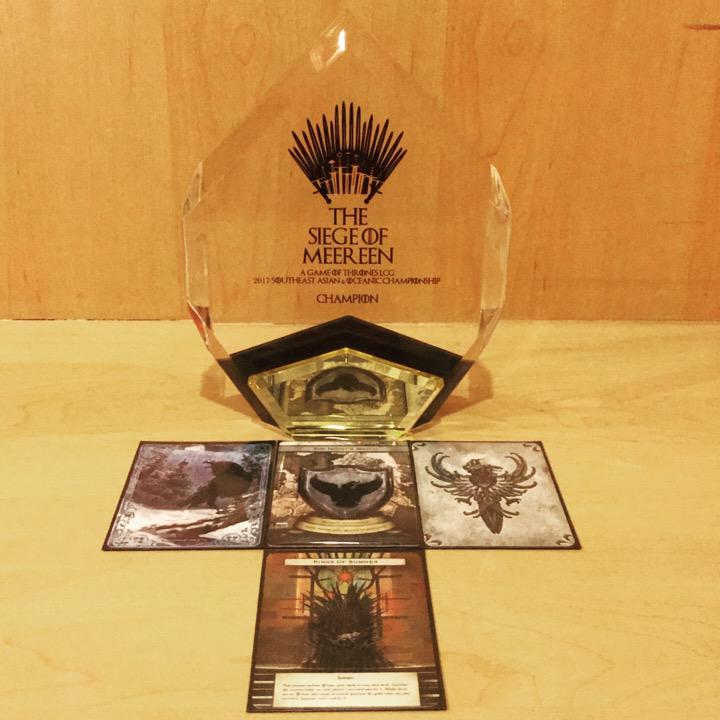
Travis’ 2017 win at the 2017 Oceanic Championship for AGOT: LCG
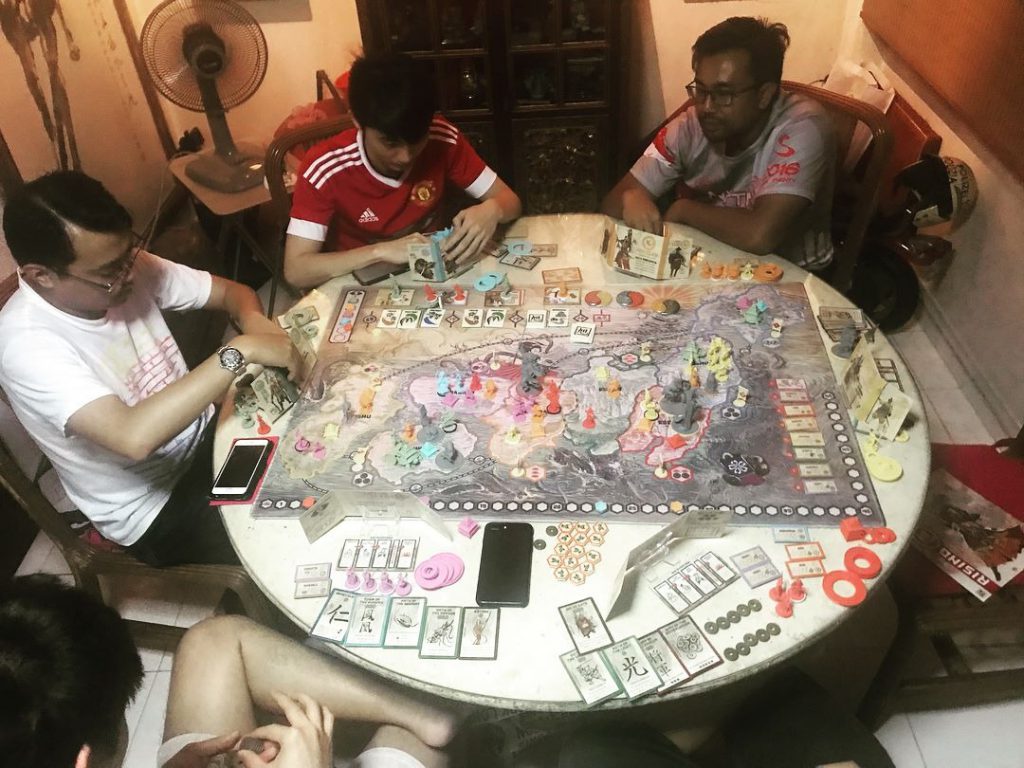
One of the many board game sessions he holds with his friends. In here, they are playing Rising Sun
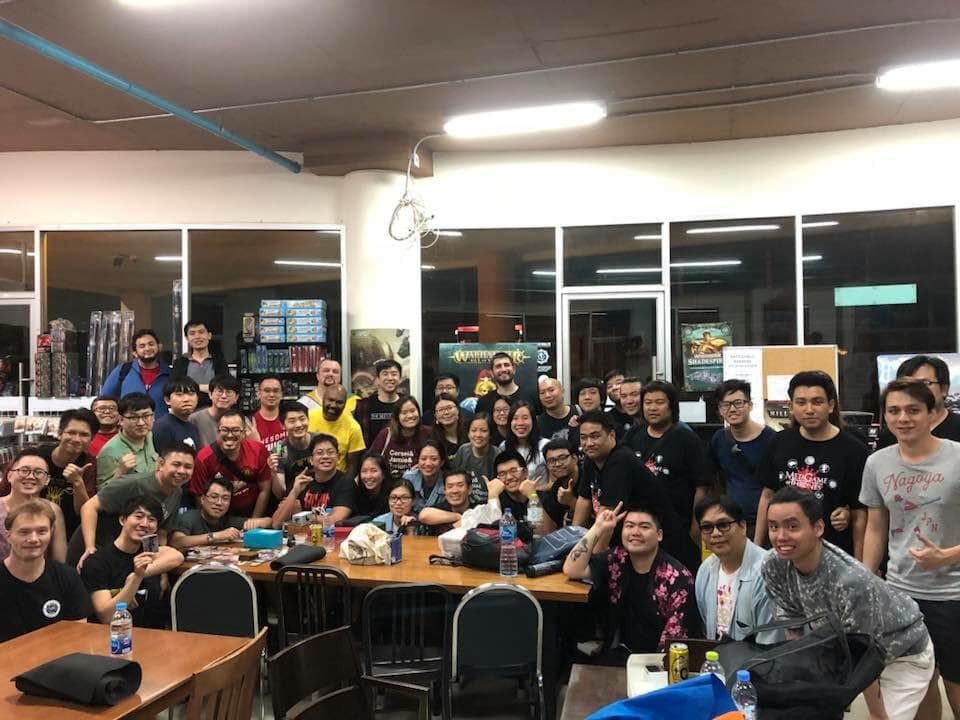
2018 AGOT:LCG Tournament in Thailand - one of the events Travis’ group organises
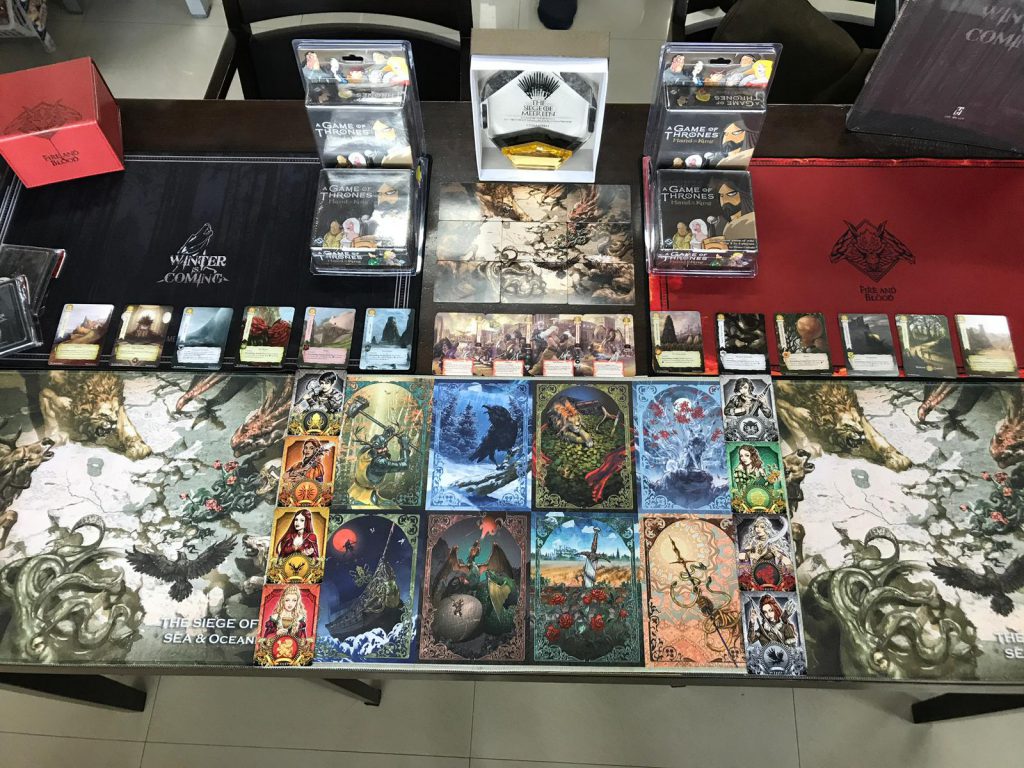
Commission works and special cards make up the prize pool for one of the tournaments they held
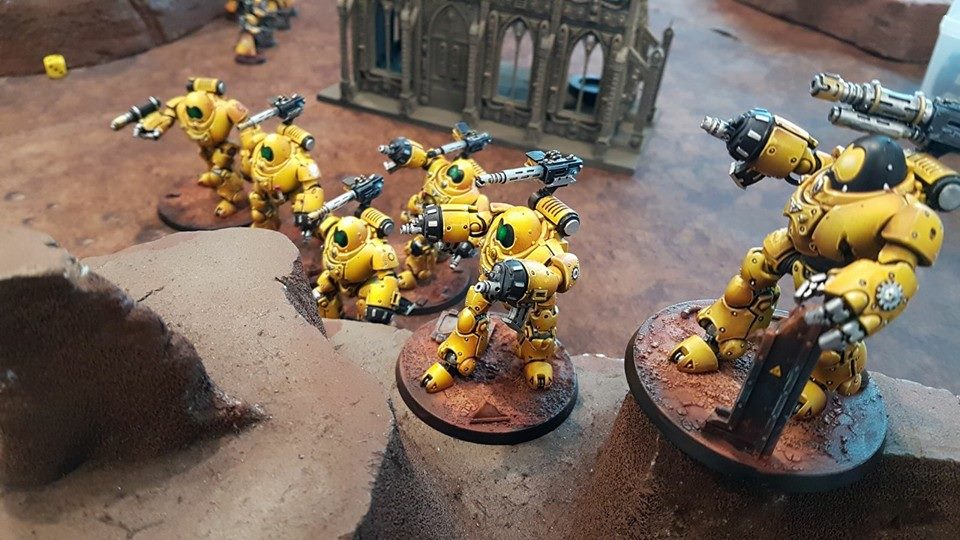
Warhammer miniatures

Game categories under the expansive umbrella of tabletop games
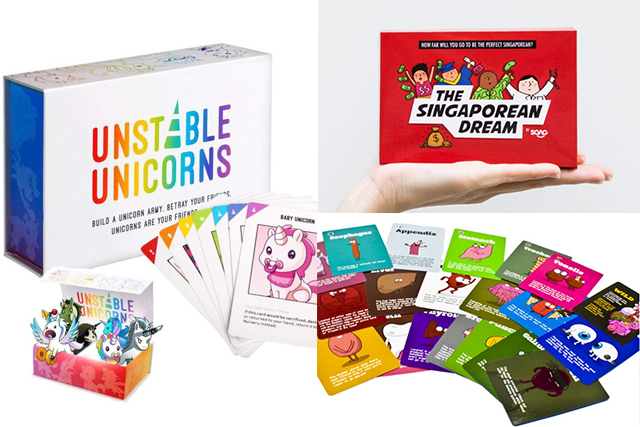
Casual card games like Cards Against Humanity, Unstable Unicorns, and the homegrown The Singaporean Dream are tabletop games that are easy to pick up for its price point and accessibility, so is our favourite Monopoly.
Making A Career Out Of Trading Magic
For another 28-year-old Mark, tabletop gaming has gone from a hobby to a career, and it all started from Pokémon. From the Pokémon Trading Card Game he picked up in primary school, Mark went on to Magic: The Gathering.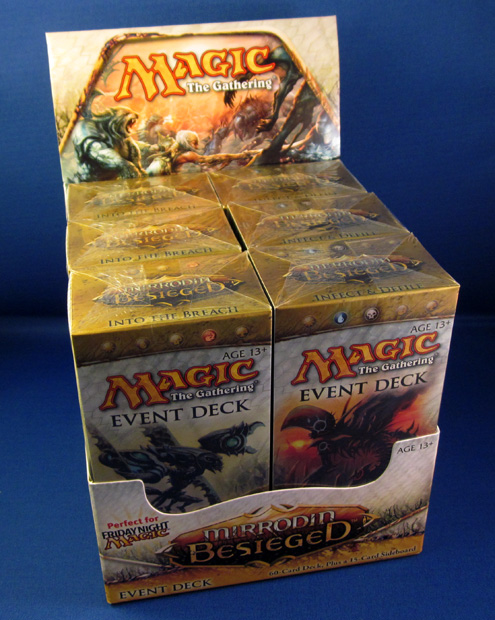
Growing With The Gaming Community
Nicholas, who is in his forties, saw exactly that — the potential in tabletop gaming in Singapore, and he, like Mark, made a career out of his passion for the games. Previously a freelance copywriter, Nicholas and his friends took over the reins of a game shop they used to frequent when they were designing their own board game. Now onto its seventh year, Gamersaurus Rex is a popular tabletop game store in Singapore. For Nicholas, whose foray into tabletop gaming started when he picked up Dungeons & Dragons in secondary school, it is also heartening to see the growth of the community in Singapore. Back in his days some 30 years ago, “there were just one or two [tabletop game shops]. Now, there are more than 10 shops.”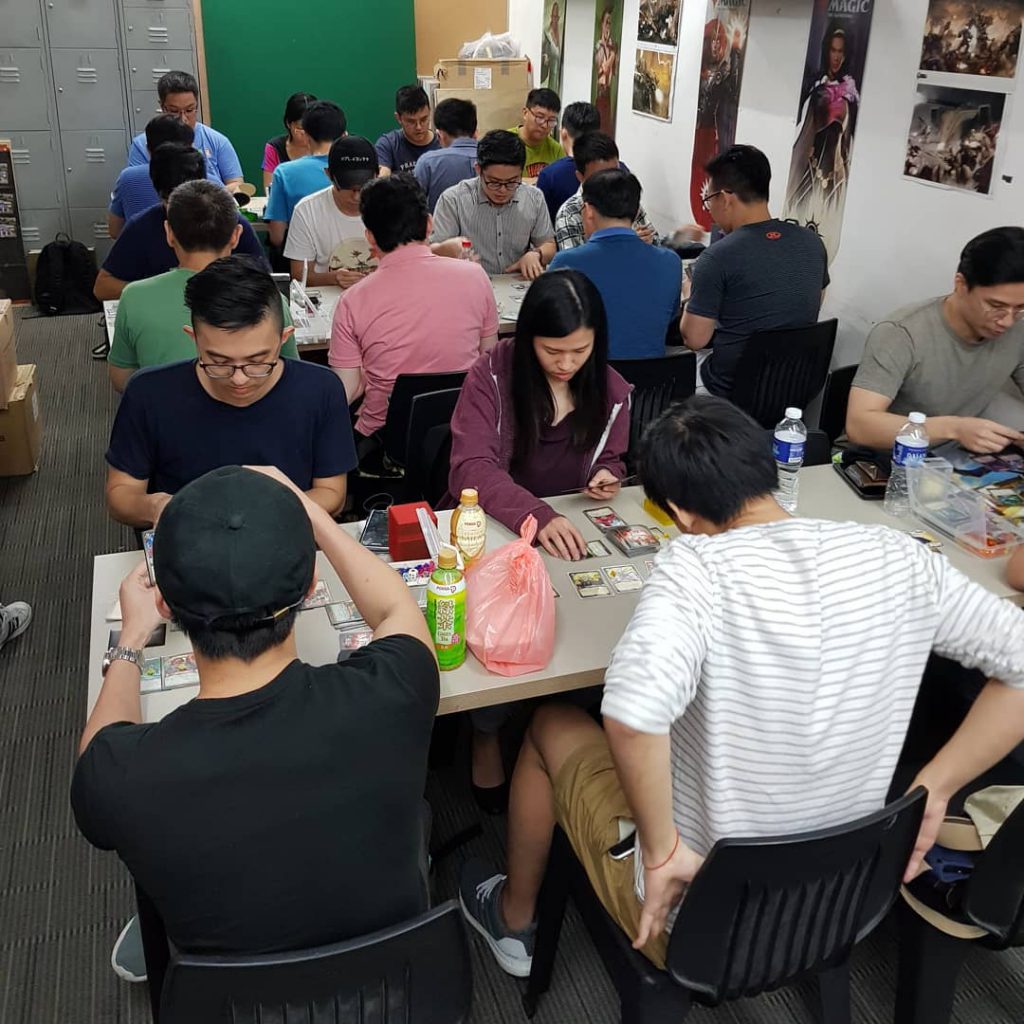
The gaming tables at Gamersaurus Rex are always full on the weekends
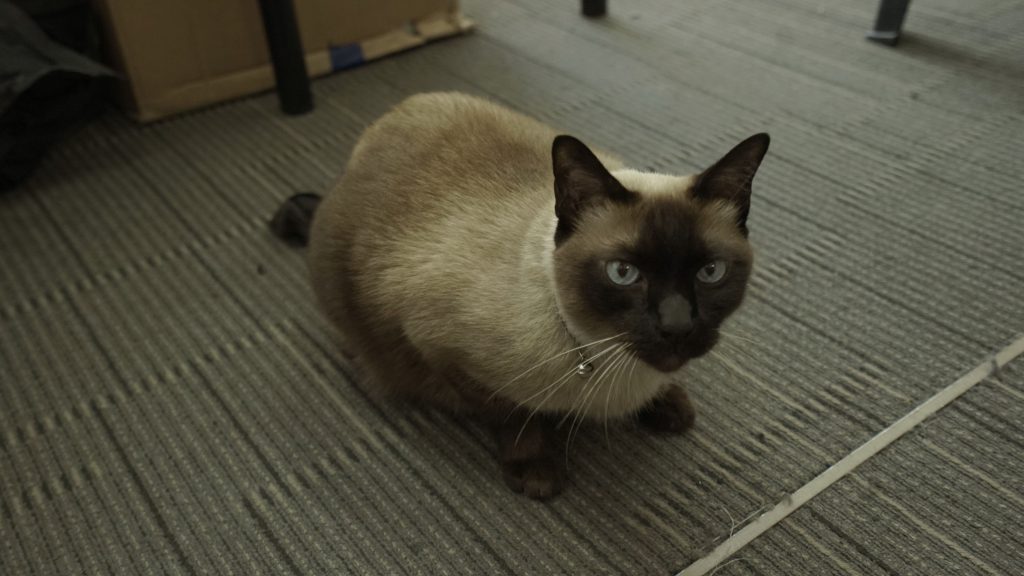
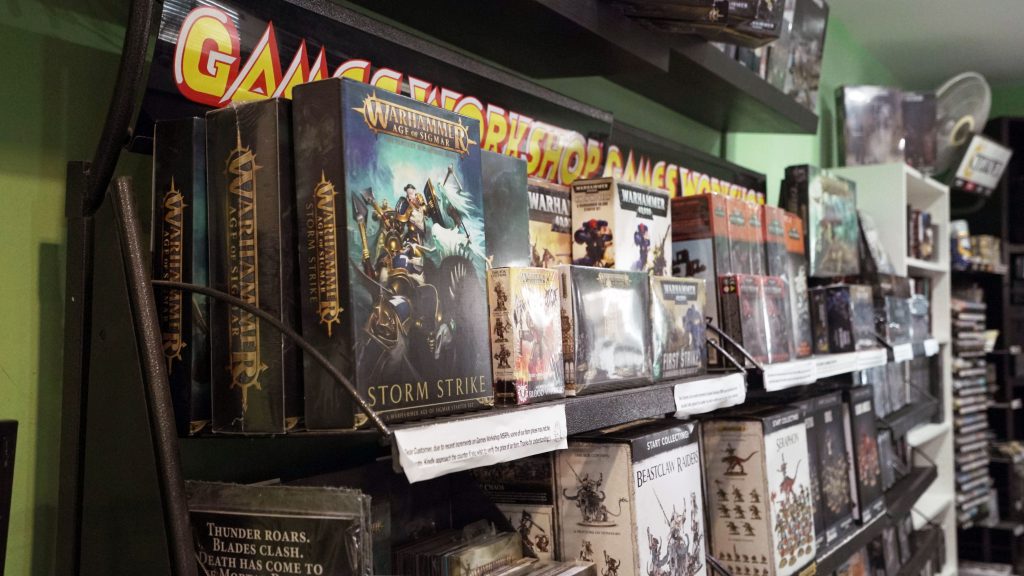
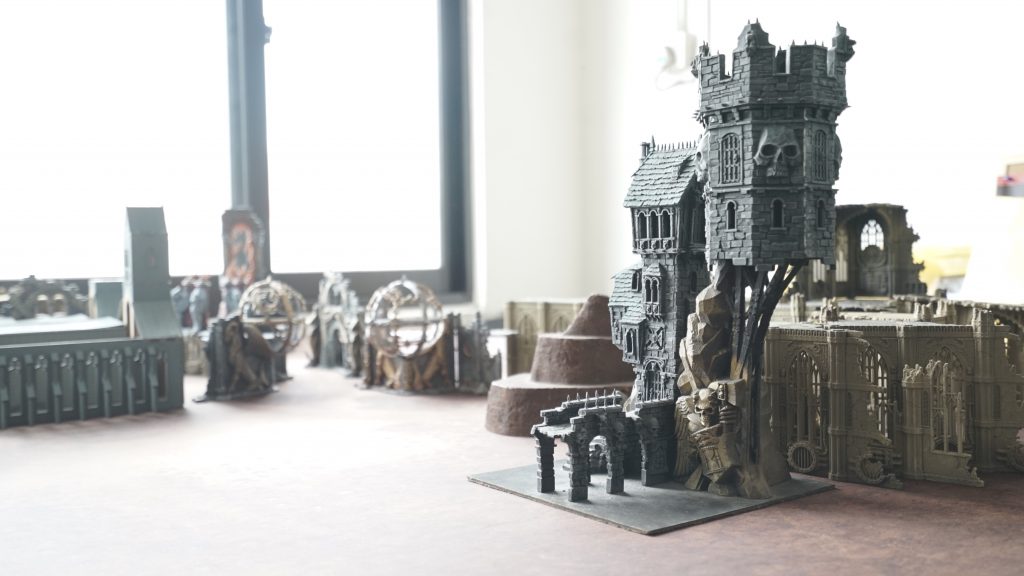
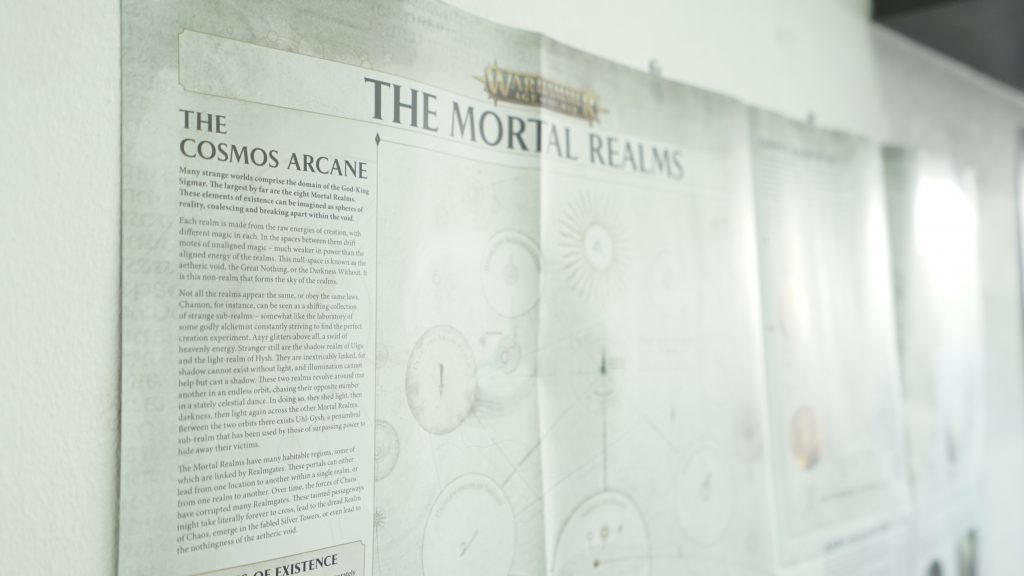
Making Friends And Landing Jobs From Playing
Most of us perceive tabletop gaming to be for reclusive nerds, but tabletop gaming is a community-based game by nature, and a lot more of a social activity than e-gaming, for example. Once a “pretty reclusive person”, Travis have “made countless friends through this hobby, which is weird since this hobby is thought to be full of nerds and introverts.” For Mark, “a full gaming experience for me is something that comes with social interaction. I really like meeting people, talking face-to-face, and discussing game strategies. It’s more wholesome.” Business aside, Mark runs several Facebook groups as well, where he continues to hold events like community meet-ups for the gamers. “It is the community building that I really enjoy in tabletop gaming. It’s like grouping all the ‘misfits’ in life, people from all walks of life just coming together to enjoy a game.” As someone who is also trying to make a living through connections, Mark highlighted the social fabric created by this ‘hobby’. “Even if you’re introverted, you will open up when you’re relaxed and having fun. You bond over the game and you start talking about each other’s life.” Mark not only knows people from all over the world now because of tabletop gaming, he has seen many people find jobs merely through playing with someone else who was hiring. Currently engaged, Travis’ fiancée emphasised that as with all things, of course, balance is important — and probably the line between obsession and hobby. “I’m very supportive of him because I understand it’s his hobby. I don’t dislike board games too. It’s a great way to bond and relax. I think that we just need to have a good balance of our priorities and don’t go overboard (pun intended).” Though, even with all the good things that have come for Travis, Mark, Nicholas, and other gamers in the community, they will remain as ‘anti-social nerds and geeks’ to the uninitiated. For them, however, it’s not a big deal. “Geeks are also cool kids nowaday.” They all told me. And it’s true, considering how Razer’s CEO, Min-Liang Tan, has (a cult following of) more than 560K followers on his Facebook page. Also read: What The Heck Do Dumpster Divers Do In Singapore?. (Header Image Credit: Geek and Sundry)What the heck is Zenly?
If you are wondering what the purpose of this app is, that was exactly us when we first knew about it. Bought over by Snapchat’s parent company, Zenly is a social networking app that lets you track your friends location 24/7 and vice versa. We turned down the invitation to join Zenly at the party that day — why would we want to be on an app that centers around people knowing our location 24/7? That’s just creepy. Imagine heading out at night, to meet a friend perhaps, only to get a text from someone asking us what we are doing going out at 10pm. Although, this does not seem to be the concern of that group of guys and other friends who are on Zenly. For many of them (mostly in their teens or early twenties), Zenly is quickly becoming their go-to social app because “a lot of my friends are on it” and “it’s the hype now”. Curiosity got the better of us and we decided to download the app to find out what the rage over this app is all about.Is it that fun to stalk, or be stalked?
Even before we got to use the app, there was already a one-star review warning us about its potential dangers.

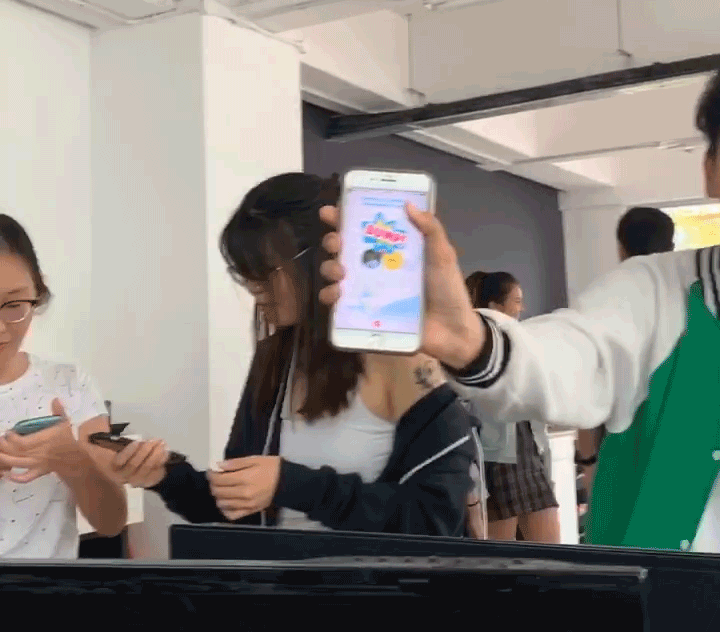

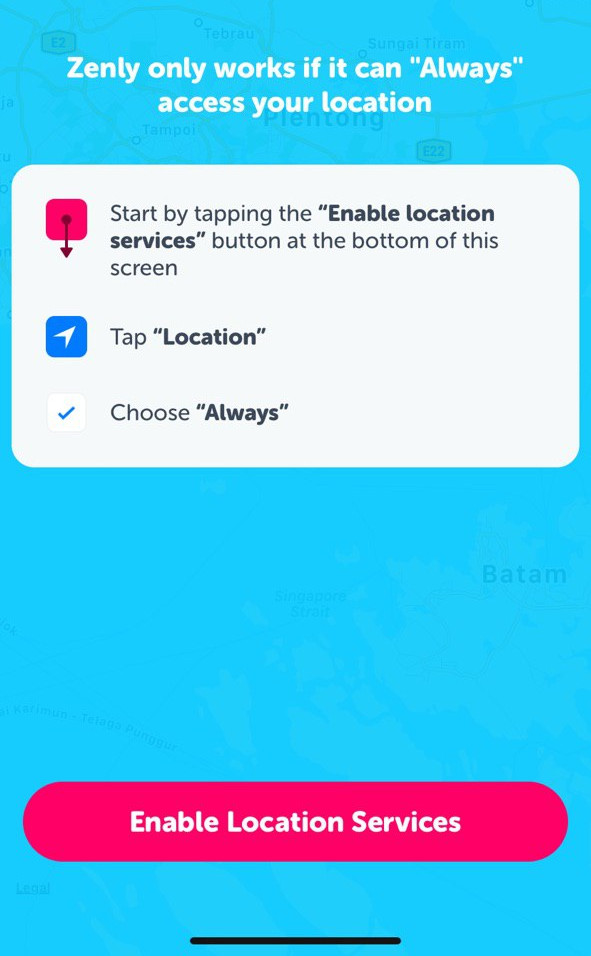
Younger Singaporeans May Not Know The Danger
Many of us are aware of the potential danger of revealing information that is so private and personal as our physical location, but the group this app appeals the most to may not be as shrewd when it comes to protecting their personal data. Currently, Zenly seems to be especially popular amongst Singaporean teenagers, with at least two colleagues telling us how their 15 and 16-year-old siblings are on it, and so are a lot of their peers.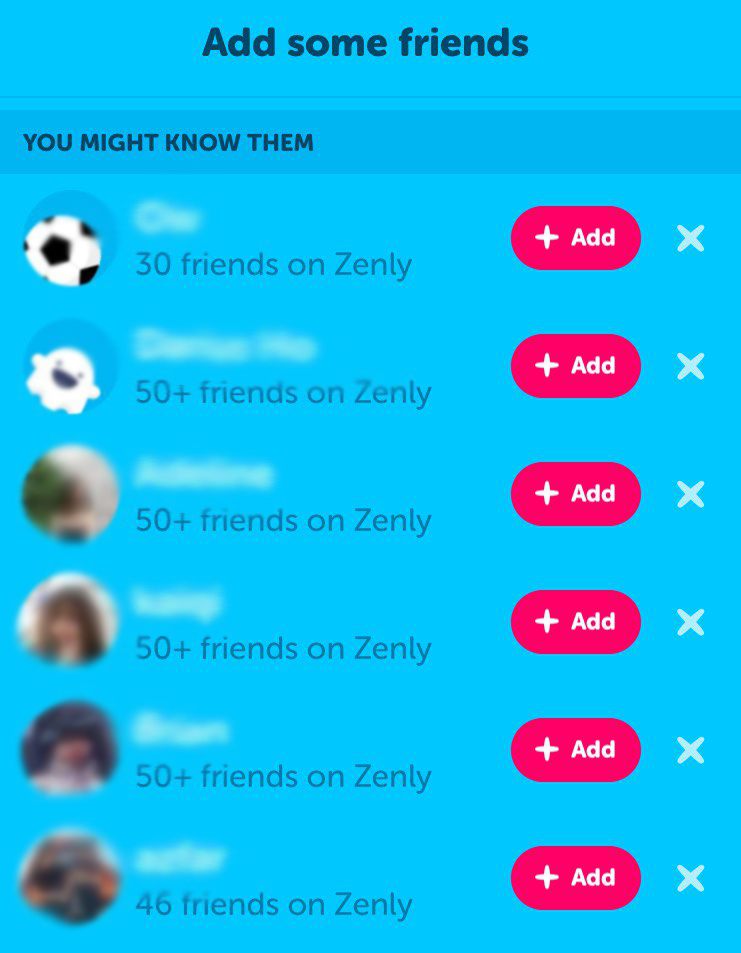

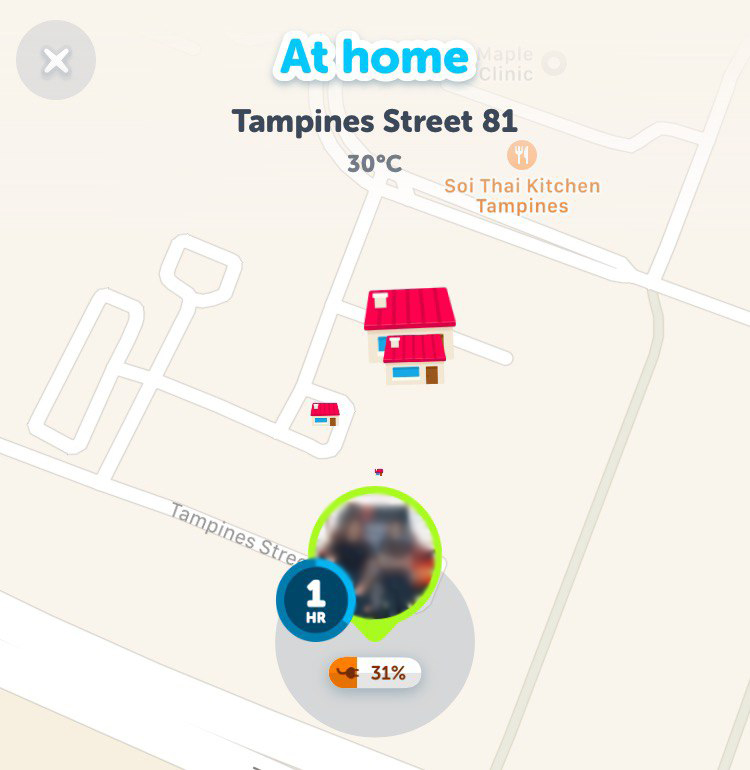
Fun To 'Stalk' Friends, But Still Very Creepy
Most of us know the amount of data social networking sites like Facebook and Instagram have been collecting from us, but it’s important for us to remember that Zenly is a whole new ball game. Our privacy and safety is at stake here, but a lot of the users who are hooked on the app may not realise the severity of it. Even within our social circles, there are young Singaporean users out there who are accepting friend requests from strangers, oblivious to the kind of dangers they have opened themselves up to. Anyone who is your friend on the app can view your whole life schedule, your usual hangout place, where you stay, where you work, and also where you study. They will know if you’re out clubbing on a Wednesday night, and when you are on the way home at 3am. We can only imagine the kind of people who would start using this app to stalk or prey on the young, or even friends that they are unhealthily obsessed with. Knowing what our friends' are up to or where they are hanging out at is gratifying. Annoying them with 100 over poop face emojis is fun. It’s a seemingly harmless social networking app if used with caution, but for us, it is still scary to know that the data of our physical locations and daily habits are being fed to the app and saved in their data storage, somewhere out there.What with so many cases of major data leaks happening in recent years. Call it paranoia, but we, for sure, don’t want to head home after a late night only to have a strange stalker waiting for us at our void deck. Besides, we value the beauty of being able to say we are ‘on the way’ when we are damn late for work, to meet our friends, or for any other work or social obligations really. With that, we tapped on the Zenly app for the very last time, and clicked on the X to delete - not before we Googled and realised the importance of manually deleting our account (all our data) before deleting the app. This is not a sponsored post. But if you want to annoy your friends on Zenly, you are more than welcome to try it. Also read: What Goes On Behind Closed Doors? Uni Students Share The ‘Juicy’ Stuff That Happens In Hall.Digging Through Trash?!
As the term suggest, dumpster diving is digging through dumpsters to salvage useful items. In other words, finding treasure in someone else’s trash. Some do it to save money, some do it to save the environment, some do it for charitable reasons, and some, just for the fun of it. Since dumpster diving in Singapore started getting more attention two years ago, more Singaporeans are opening up to it. But even with the increasing interest, Singaporeans still largely perceive dumpster diving to be a bizarre activity. “Why do people even want to dig through trash?” “Only poor people need to dumpster dive.” “Can find anything good from dumpsters meh? If it’s still good why will people throw it away?” However, as shared by the co-founder of Freegan in Singapore, Colin, “people have the wrong idea that everything in the trash is worthless.”The Man Behind ‘Freegan In Singapore’
Ever since he started dumpster diving in 2016, Colin has found valuable items that we would never have thought we would find in dumpsters. Electronics like television sets, mobile phones, and ovens are common finds, so are kitchenware and perfect condition furniture. He has also found hundreds of branded bags before from Prada, Louis Vuitton, Coach, and Gucci. Besides small defects, most of these bags are still in good, working condition when he found them in the dumpsters. For example, one of the bags he found had a broken zipper pull tab which he simply replaced with a twist tie - “the kind from the bread from bakeries.” In a post he wrote on Freegan in Singapore recently, a Facebook page he co-founded, Colin added that “when people shift, renovate, spring clean or have a recently deceased loved one, they will throw away amazing items in perfect condition.” As a leader of the freegan community here, which has close to 7,500 members in its Facebook group, Colin has trained and is still training disciples to continue the work of dumpster diving for charitable reasons and advocating the freegan lifestyle.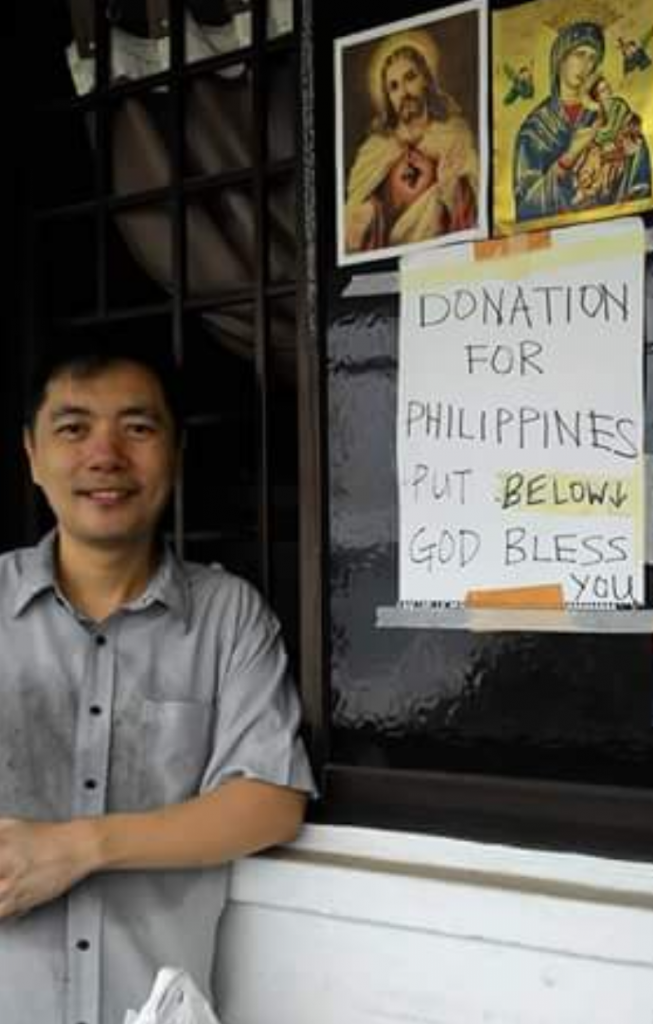
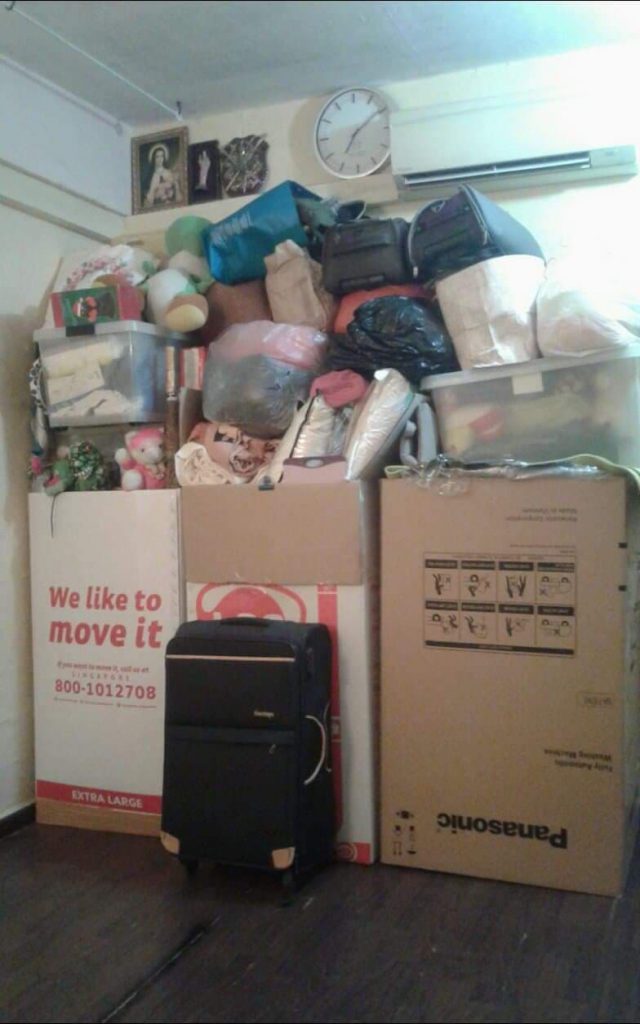
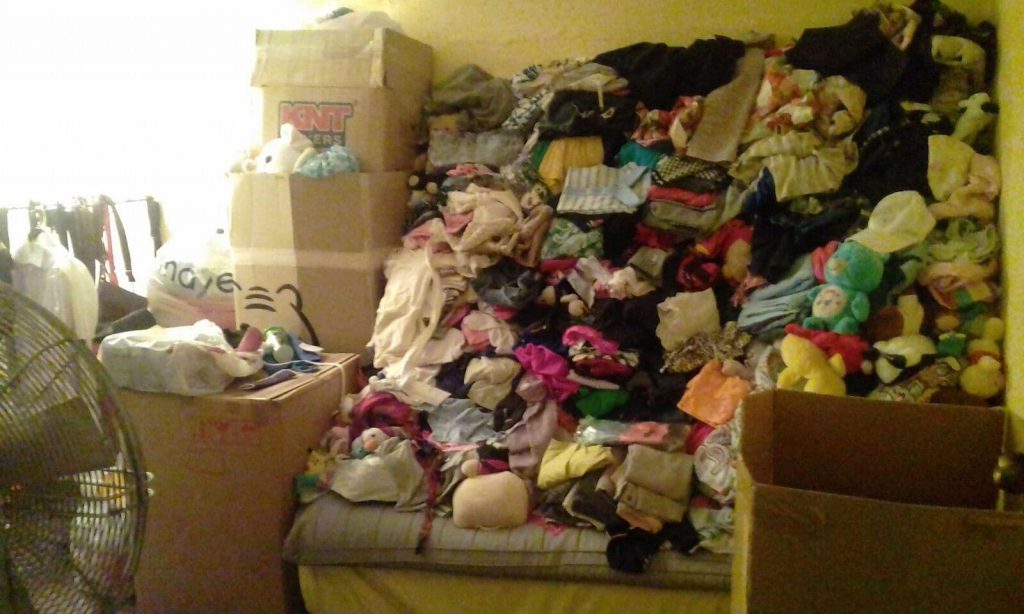
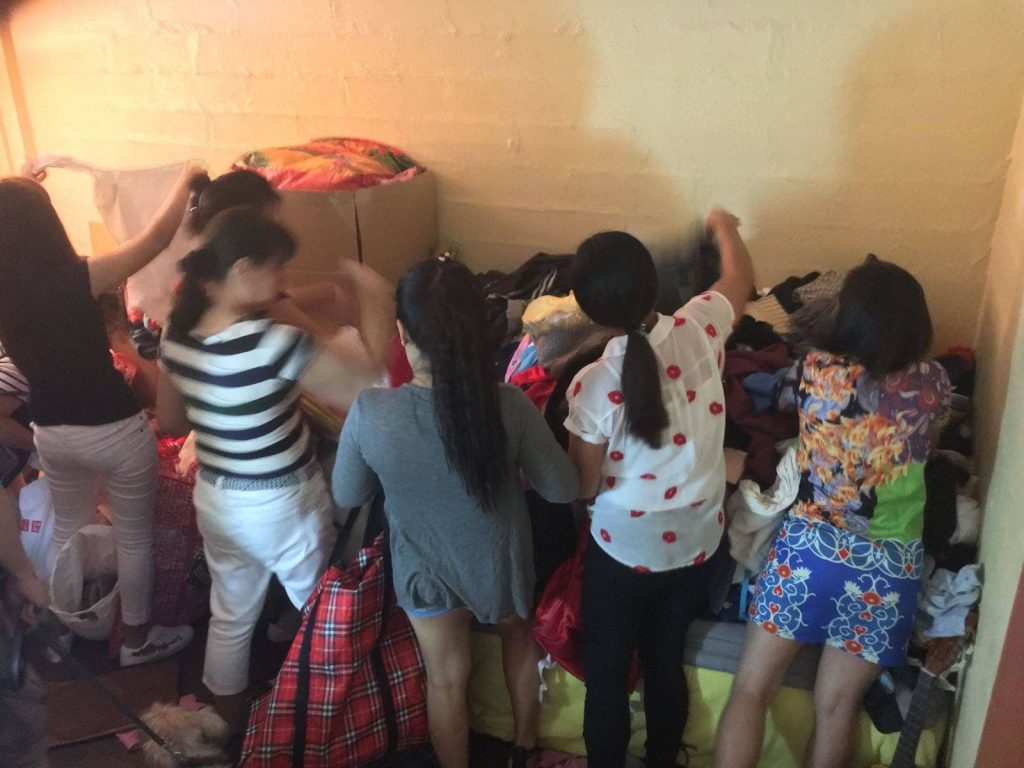
“I didn’t even dare to do it initially! I watch a lot of videos until I’m very sure and got the PHD already then I went to try.”Colin later found that his food, merchandise, and monthly expenses dropped to less than $100 after he started dumpster diving. The beginning of the Filiporean Project came on his fourth day, when he took home a bag of good quality female clothes, which was later passed on to a Filipina.
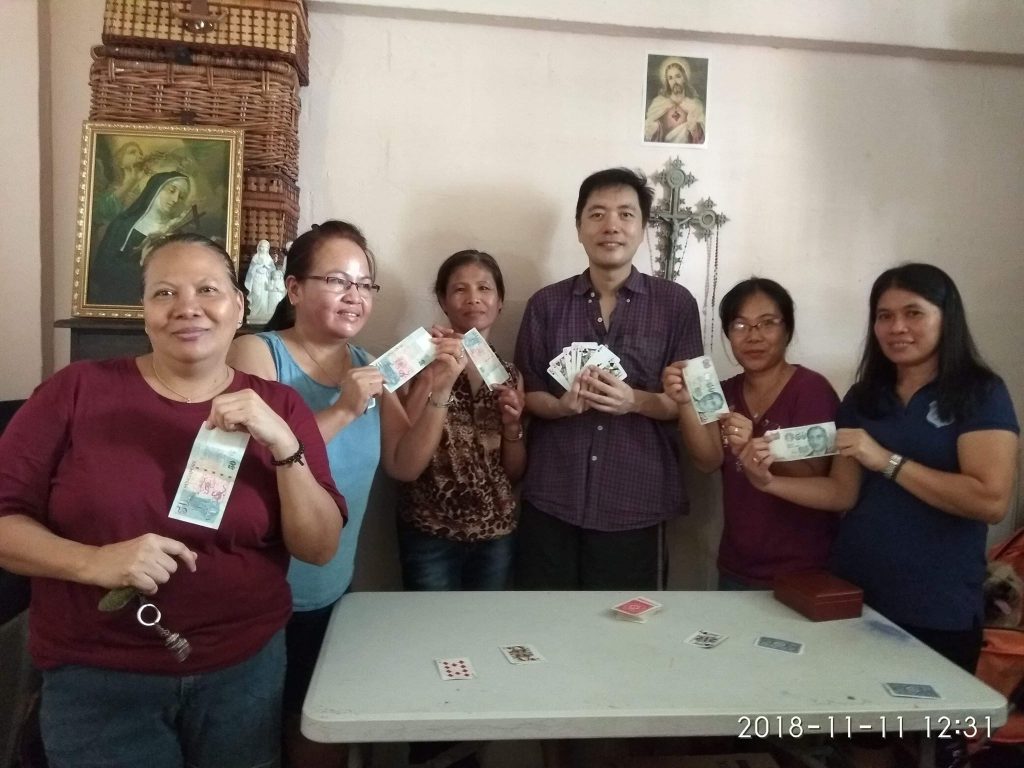

Rescuing Food
Like what Colin does for merchandises, Daniel does for food.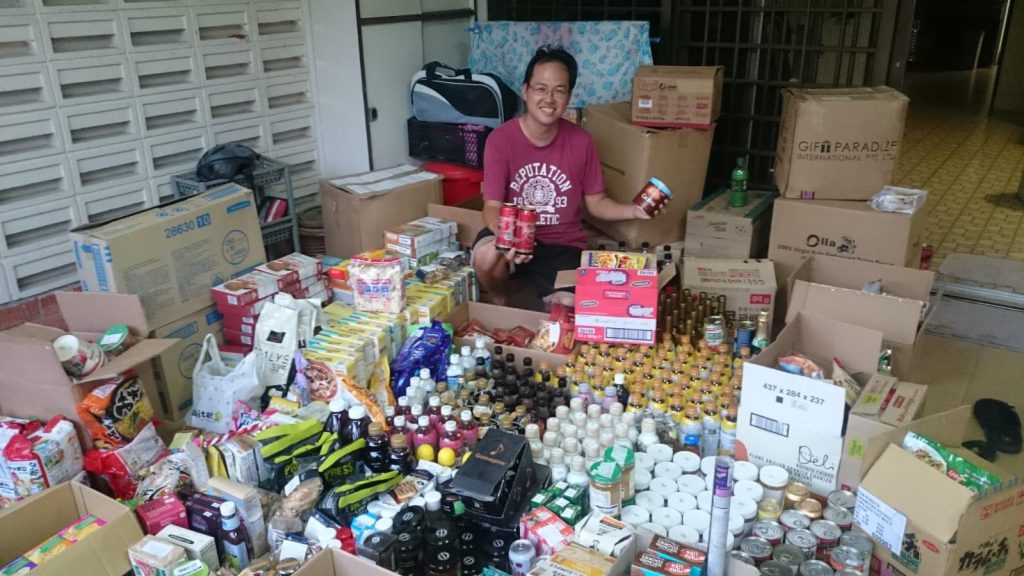
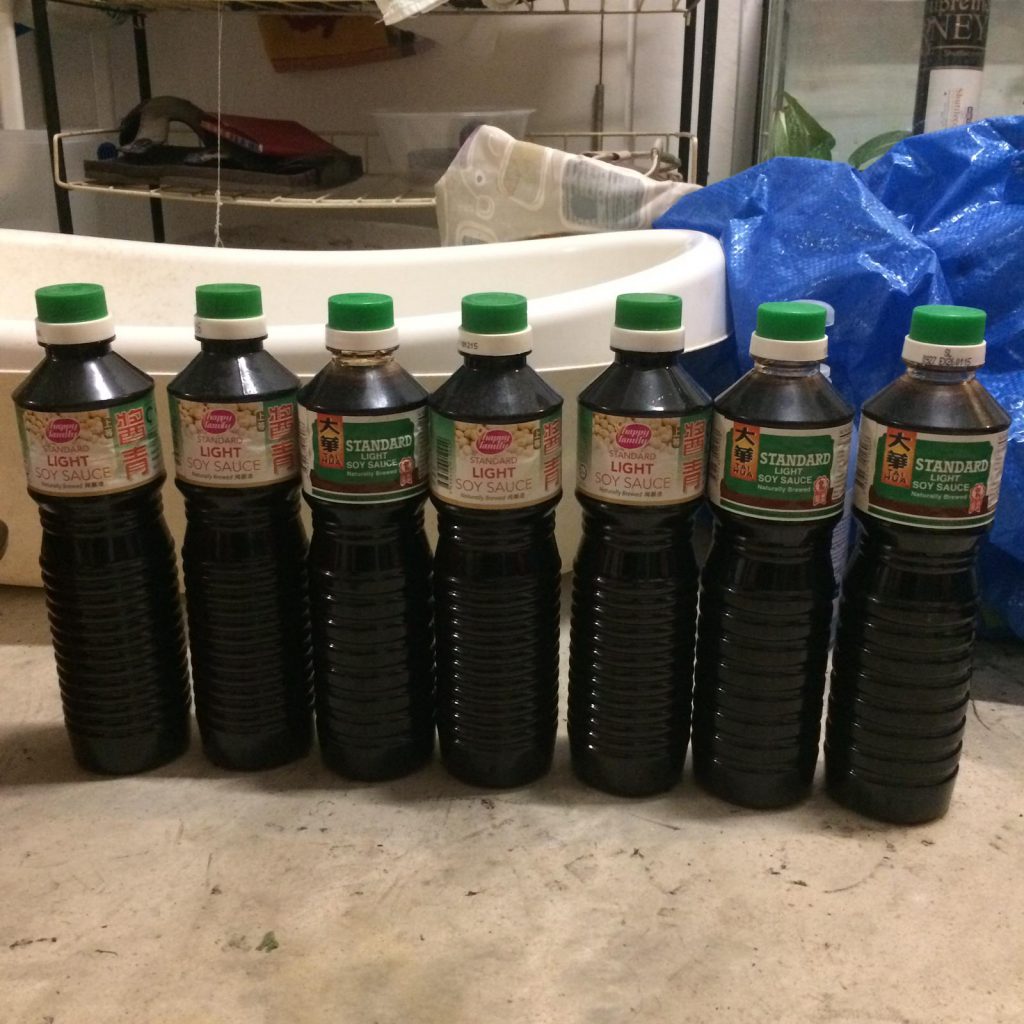
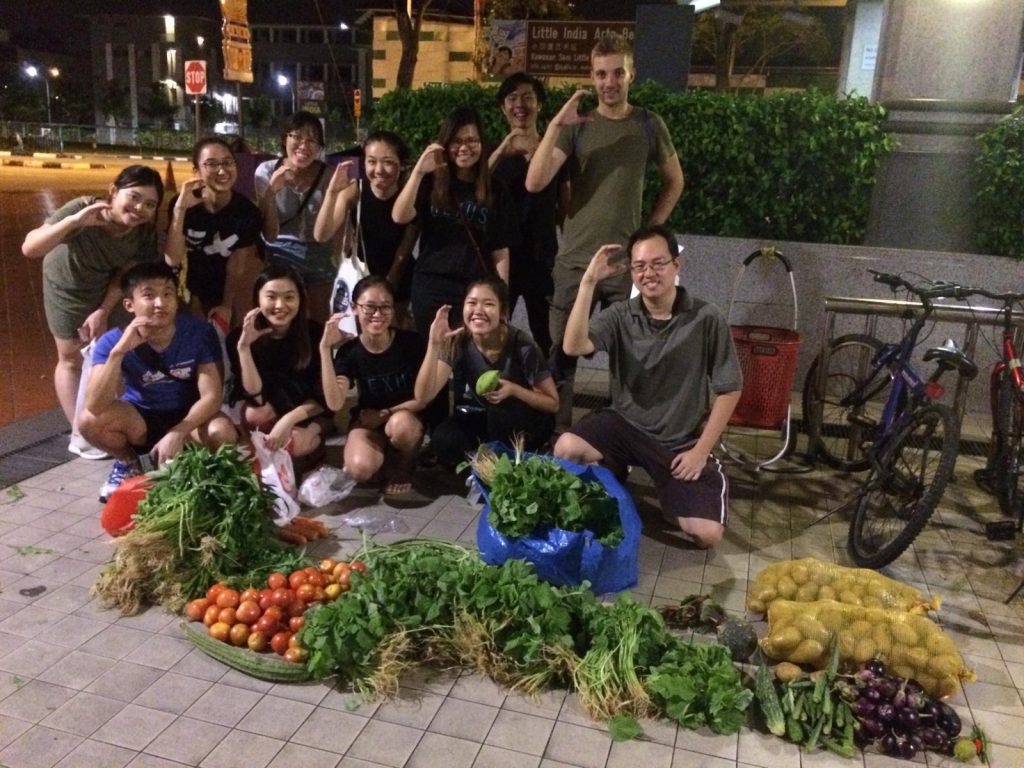
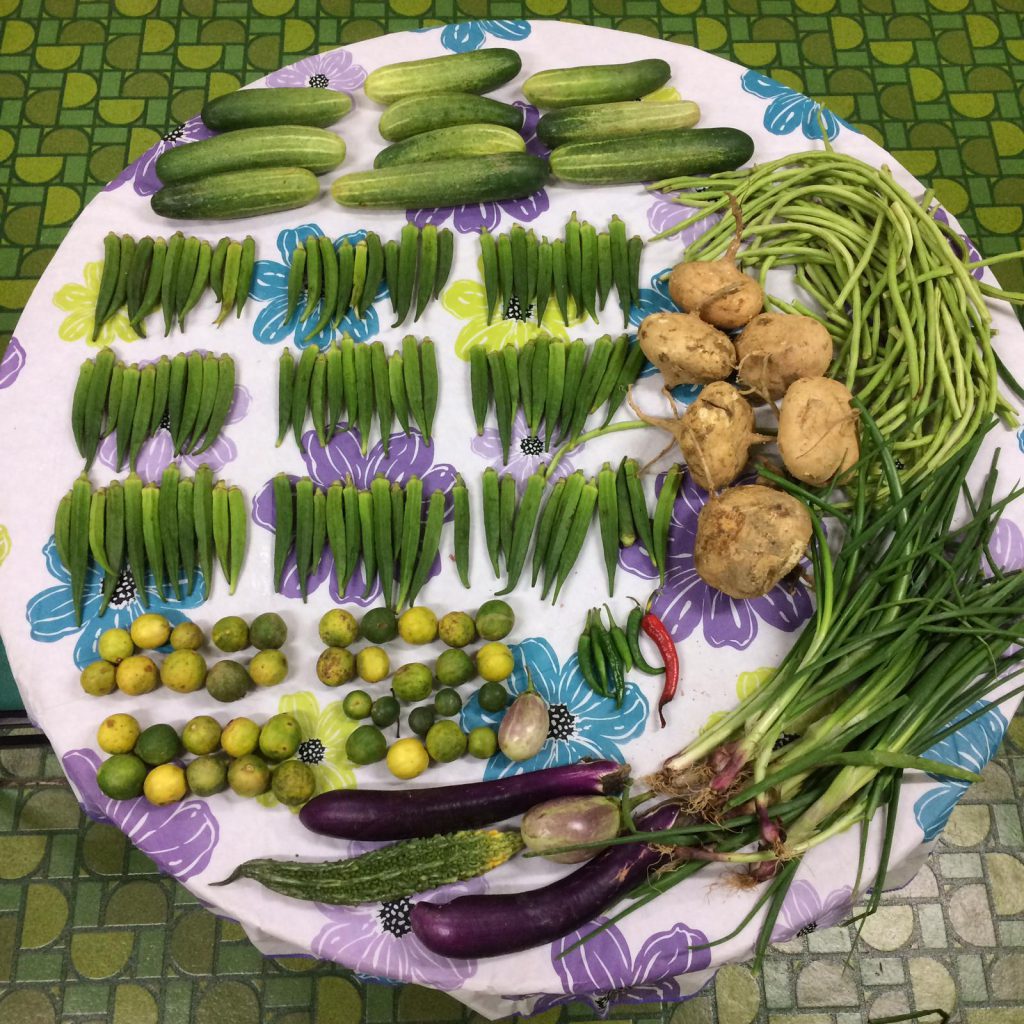
“A freegan is someone who rejects consumerism and seeks to reduce waste, especially by retrieving and reusing discarded items.”As defined in the Facebook group and reiterated by both Colin and Daniel, freegans do see the need to spend money on things that they can get for free. In the middle of my interview with Daniel at McDonald’s, he got up suddenly, “wait ah, wait ah,” only to return with a used straw, which he proceeded to wipe with paper napkins before using it to stir his cup of tea. He explained how this is one of the many things that encompasses the freegan philosophy. “You’re signalling to the company that they need to put more straws, but that’s not good for the environment. But if you take one that somebody has already used, you’re not creating any more demand.” While Daniel’s rationale made sense, I couldn’t help but feel uncomfortable thinking about the possibility of contamination. Who knows what people do with straws, or their utensils, or food after they are done with it. I shuddered at that thought, but also felt guilty for my nonchalance in using plastics. On the flipside, Daniel had only ever gotten food poisoning from food that was bought. “Because I know it’s rescued food, I’m a lot more stringent and careful.” As a general practice, freegans like Daniel practice the Look-Smell-Taste test method to determine whether a certain food product is safe to eat. Obviously, meat with maggots crawling around is out of the question, and for Daniel, so are dented, rusty, or bloated cans of food. Expired food however, are one of the common foods that freegans rescue for consumption. As Colin best puts it, “Most [locals] think that food spoils one second after midnight of the best before date. But we freegans believe that food is not equipped with a self destructive device that can activate itself at the stroke of midnight of the expiry date. Daniel had even had 12-years-expired chicken essence. Even though the initial thought of consuming something that has expired for 12 years did make his stomach churn, Daniel explains that it is most a psychological reaction that can be overcome by testing it out. As leaders in the dumpster diving and freegan community, Colin and Daniel are what Colin refers to as ‘Rambo dumpster divers’ who map out their attack route, and dig and grab every good thing they see.
Dumpster Diving As A Hobby
Then, there is the second type of dumpster divers which make up the bulk of the community - the ‘casual encounter’ type. And we met one such casual encounter dumpster diver last month: Bianca.https://www.facebook.com/millennialsofsingapore/videos/604032170054484/
A fellow millennial in her first full-time job as a teacher, Bianca usually dumpster dives with her boyfriend. Although their dumpster diving ‘trips’ are never planned, Bianca has found herself rescuing bags of clothes and assortments of housewares for her family, boyfriend, friends, and herself. “It’s usually when we are walking to my block from the bus stop for example, and we’ll just check the bins along the way.” Bianca also often does barter trades and gives away rescued items on the various dumpster diving and freegan groups online. Unlike Colin and Daniel who started for practical reasons, Bianca’s interest in dumpster diving germinated from a concern for the environment. “The whole thing started when I watched some PETA videos in Secondary school. I started realising that whatever we consume, be it shampoo, soap, or anything we use on a daily basis, have an impact on the environment.” Knowing that her spending money on certain companies indirectly supports them in their cruel practices, Bianca began to switch to companies which are ethically or environmentally conscious in their business practices. It was when she went on a ‘clothes fast’ in 2016 to curb her shopping addiction when she realised that she didn’t need a lot of material goods in her life. “I didn’t buy any clothes for one year. Dumpster diving came along shortly after the clothes fast. I realised that if I can do with fewer clothes, I can do with fewer things. At the same time, I thought, maybe I don’t need to buy stuff, I can just look out for free stuff.”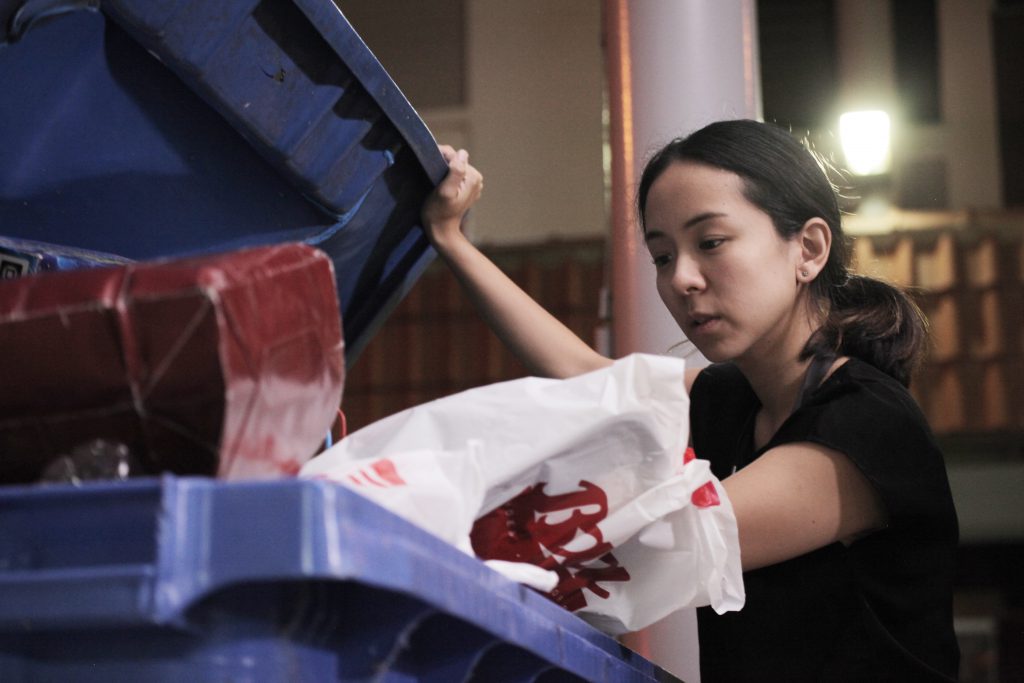
Mixing Business And Personal
There’s a saying that you should never work with friends, otherwise, you have to be prepared for the possible death of that friendship. Working with family or a loved one? Even tougher - how do you even deal with them back at home after fighting at work? In our Singaporean culture especially, where we are too non-confrontational and would feel too paiseh to offend anyone, that ‘anyone’ being someone we love makes it that much more problematic. And no one wants to be stuck in that awkward dilemma between being nice and having to do their job right. Similarly, there’s a long-standing belief that you should never ‘shit where you eat’. Some would rather leave a company than start a romantic relationship with their colleague. Yet today, all these beliefs seem to be more of a myth, as we see more Singaporeans choosing to work with friends, continuing their family businesses, and also being co-bosses to their businesses with their romantic partner. We spoke to some couples who chose to hustle together to find out how the heck they survive as partners-in-crime in all aspects of their life.Daniel and Natasha - From Boss And Employee To Lovers
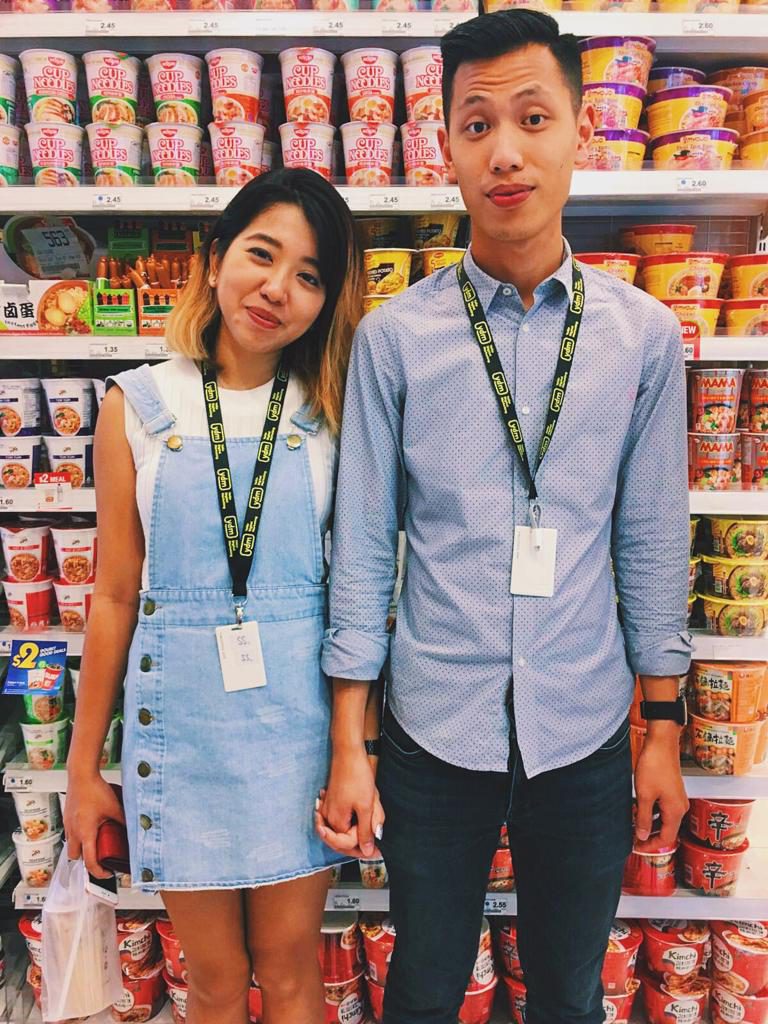
Wei Zhang & Pauline - A Marriage Of Work And Play
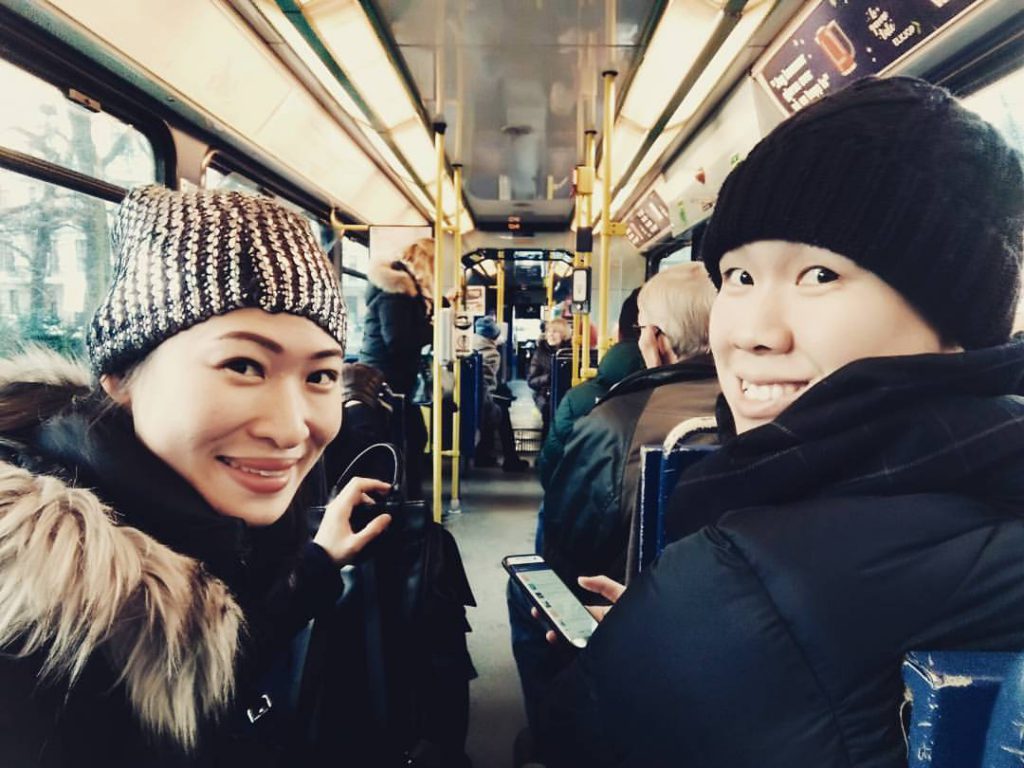
Nerissa and Abel - No Sweat In Working Together
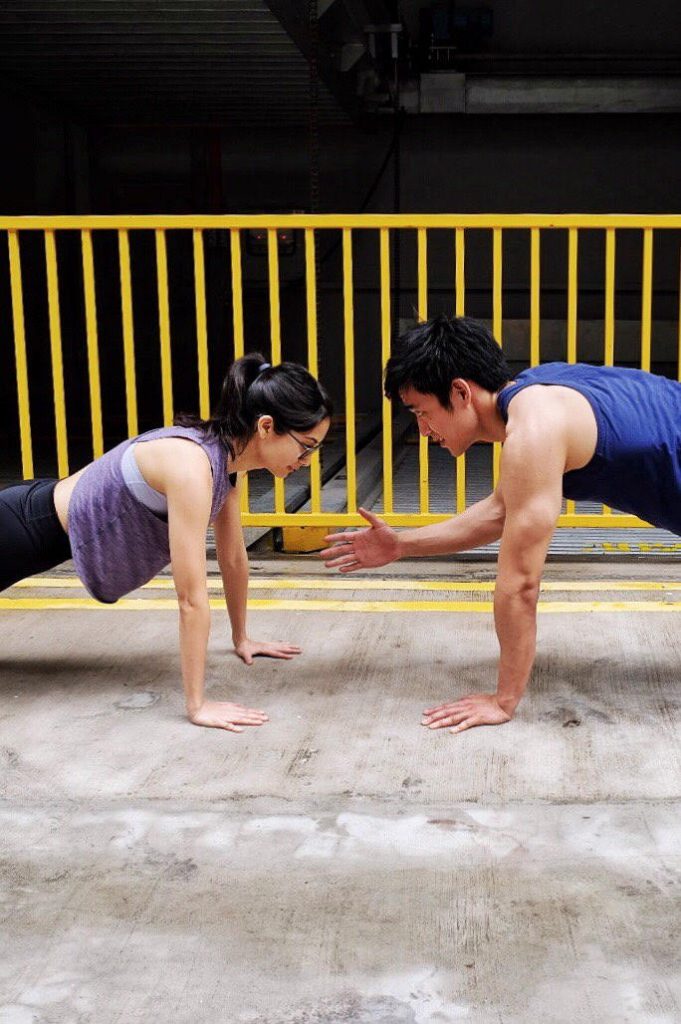
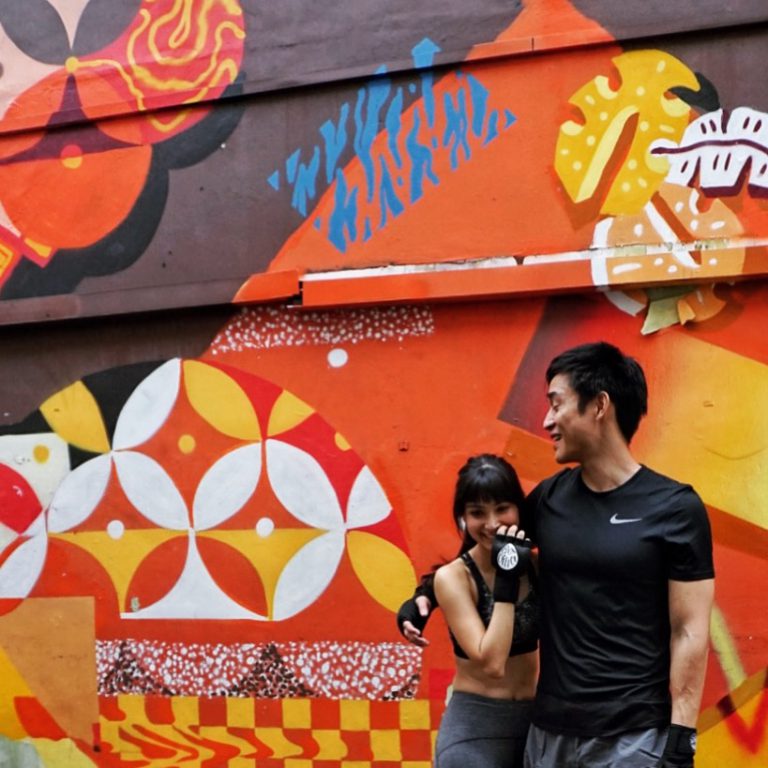
Blurring Lines Between Business And Personal
Working with someone you are close to can be tricky as there is an emotional baggage, making it tough to clearly distinguish work conflict apart from personal feuds. Furthermore when you’re dealing with someone you love. It’s also bold to start and run a business in Singapore’s ultra-competitive landscape. And it’s heartening to see that millennials are breaking the trite stereotype of millennials being underachieving strawberries. What more, going against the grain together with their other half. There may be a belief that business and personal can never go well together, but these couples, and the couples we spoke to on camera a year ago for the video Can Couples Work Together?, prove otherwise. https://www.facebook.com/millennialsofsingapore/videos/844305589064193/ Juggling work and personal is no longer a miracle as long as each individual is determined to make things work with the other. Most of all, it is the trust and respect that they have got each other’s back. Also read: Paktor Do What? 9 Singaporean Couples Share What They Do On Dates.Going Against The Will Of His Only Family
Most of us will have no qualms going against our parents once in awhile because after all, our growing up phase also meant us wanting to ‘live a little’. For Ludfee, things are different, because he never had parents. Ever since his parents left him at the hospital after he was born, his grandparents have been his only family. He never knew who his mother or father were, how they look like, or why they abandoned him, but as I chatted with Ludfee, I deduced that he is someone who chooses to look on the bright side of things. “I wouldn’t wish that things were different. I prefer staying with my grandma actually, because I’ve heard about friends having to face strict curfews and rules from their parents. My grandma isn’t very strict, which I’m grateful for. But she nags about religion.” Making the decision to pursue music wasn’t easy back at home as his grandmother wanted him to take a ‘traditional route’ in business. He wanted to study Digital Audio Video Production, but went for businesses services at ITE College Central in the end so as not to complicate matters at home. Nonetheless, arguments with his grandmother still happen from time to time. “My grandma would always say that my priorities are wrong and that I’m choosing music over religion. It gets tiring to have to argue about this again and again.” Ludfee explained how he has had to forgo events like family dinners or religious gatherings for competition trainings or performance rehearsals. However, he tries to ‘lessen the burden’ as much as possible, like taking up a barista job after secondary school to earn his own keep and to fund his own music pursuits. “My grandma have somewhat of an income as she works at a food stall with her friends. But I want to earn some money for myself and for my music instead of relying on her.”Making It Work
Like all musicians in Singapore, Ludfee knew that it wasn’t going to be an easy route. With a cappella group, That Acappella Group (T.A.G), he has gotten many performance opportunities including singing for our President and also competing in this year's National A Cappella Championships, where they have been crowned the winner and 1st Runner-up in the College Category.
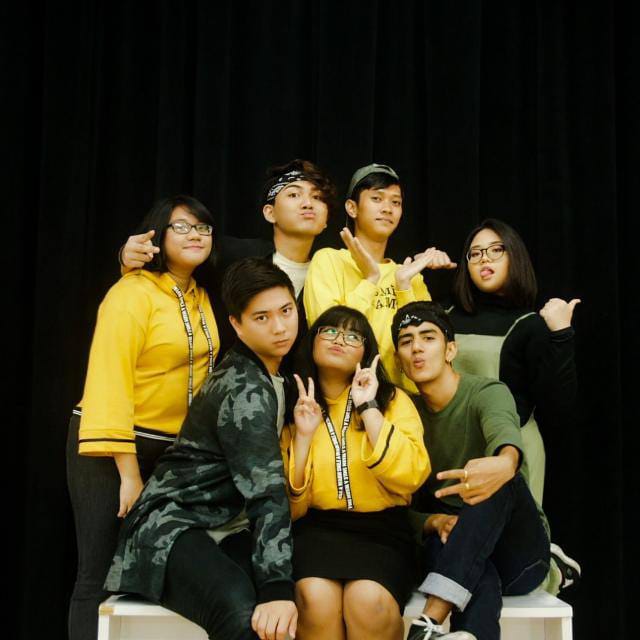
Support Our Local Talents At Voices
Although Ludfee has big dreams of publishing his own music and also sharing his interest as a music teacher in the future, his current goal is getting more publicity and appreciation for his music. Catch Ludfee at Voices – A Festival of Song at Esplanade - Theatres on the Bay this 7 to 9 December, where he will be performing with T.A.G as the lead bass singer, and also tenor and alto with Sticks & Kebab!